95. 5 Skills to Regulate Your Emotions, Decrease Emotional Vulnerability, + Build Your Life Worth Living
listen to this episode:
Tune in and subscribe on your favorite platform: Apple Podcasts | Spotify | Stitcher | Google Play | Radio Public | PocketCasts | Overcast | Breaker | Anchor
Today's solo episode is all about the emotion regulation module of DBT (dialectical behavioral therapy). I dive into everything you need to know to decrease your emotional vulnerability, effectively cope with emotions that arise and improve regulation long-term. Skills/topics mentioned include building your life worth living, understanding your priorities/values so you can live in line with them, ABC PLEASE skills, mindfulness of current emotions, and changing emotional responses.
Mentioned In The Episode…
+ DBT
+ Ep. 90 Crisis Survival 101: Coping Skills, SUDs Scores, + My Recommendations
+ Emotion Regulation Worksheets (on the blog)
+ Lost Connections by Johann Hari
+ Ep. 39 Your Foolproof Guide to a Good Night's Sleep (+ 2 Guided Sleep Meditation Practices)
SHOP GUEST RECOMMENDATIONS: https://amzn.to/3A69GOC
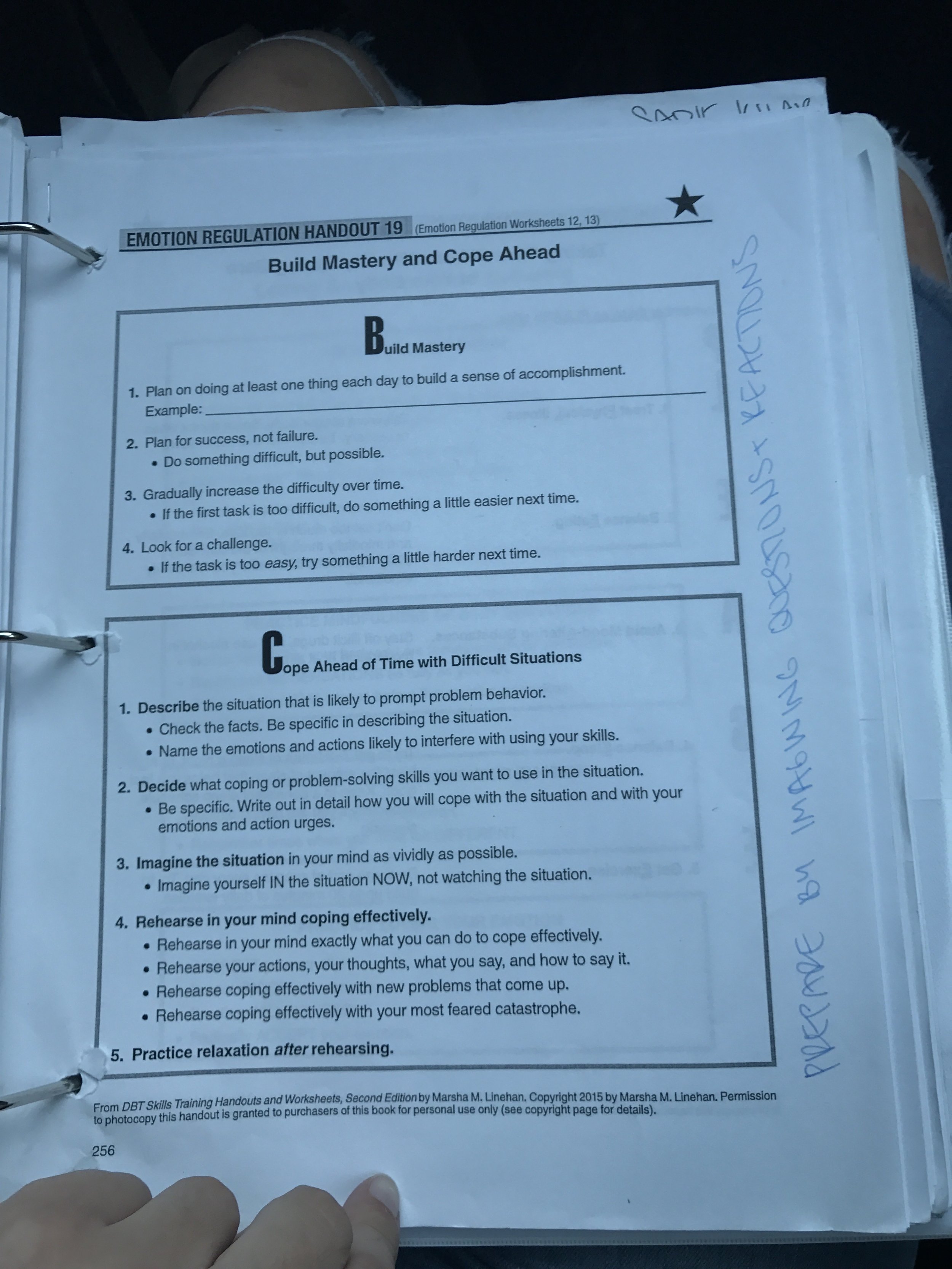
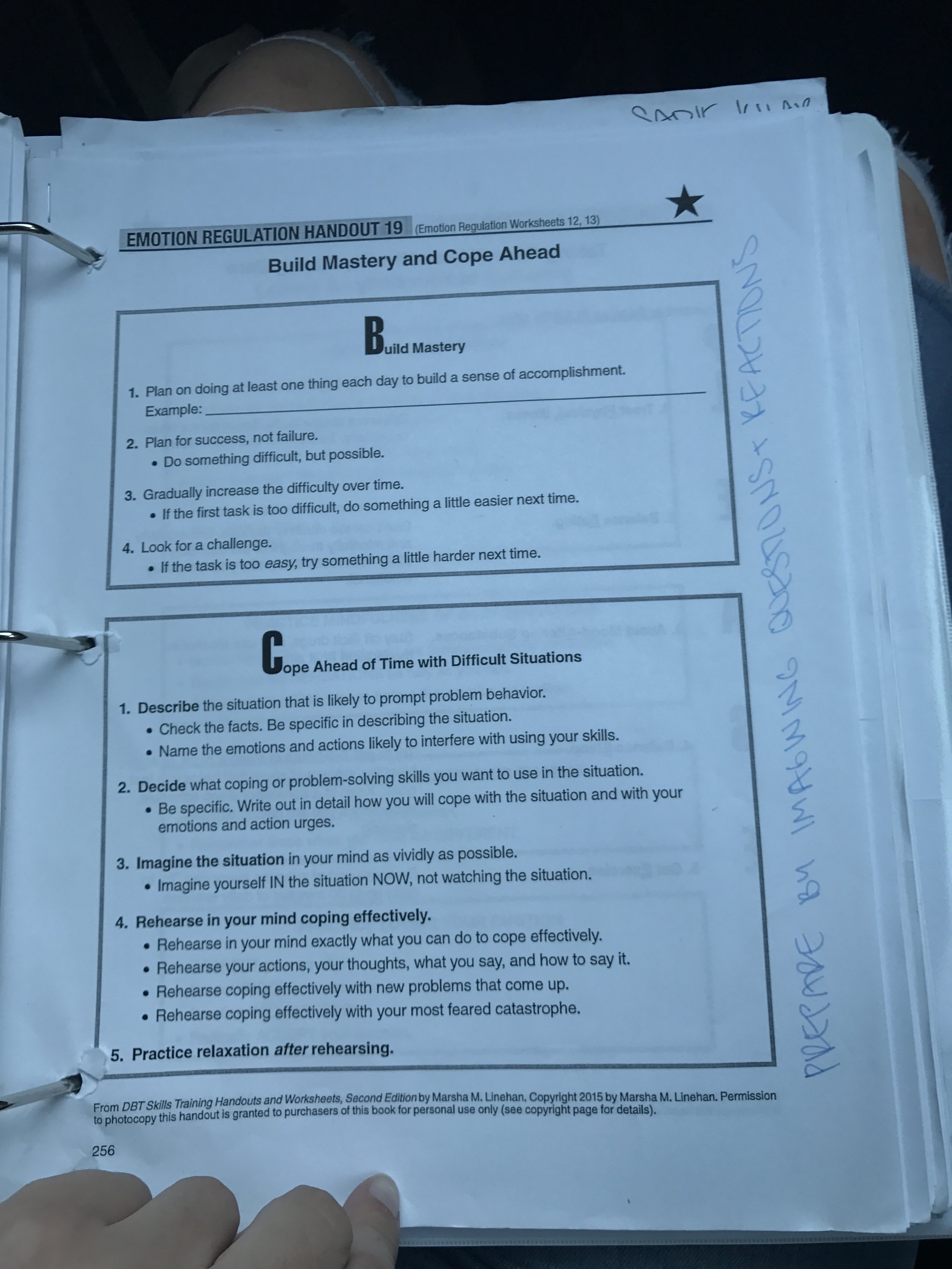
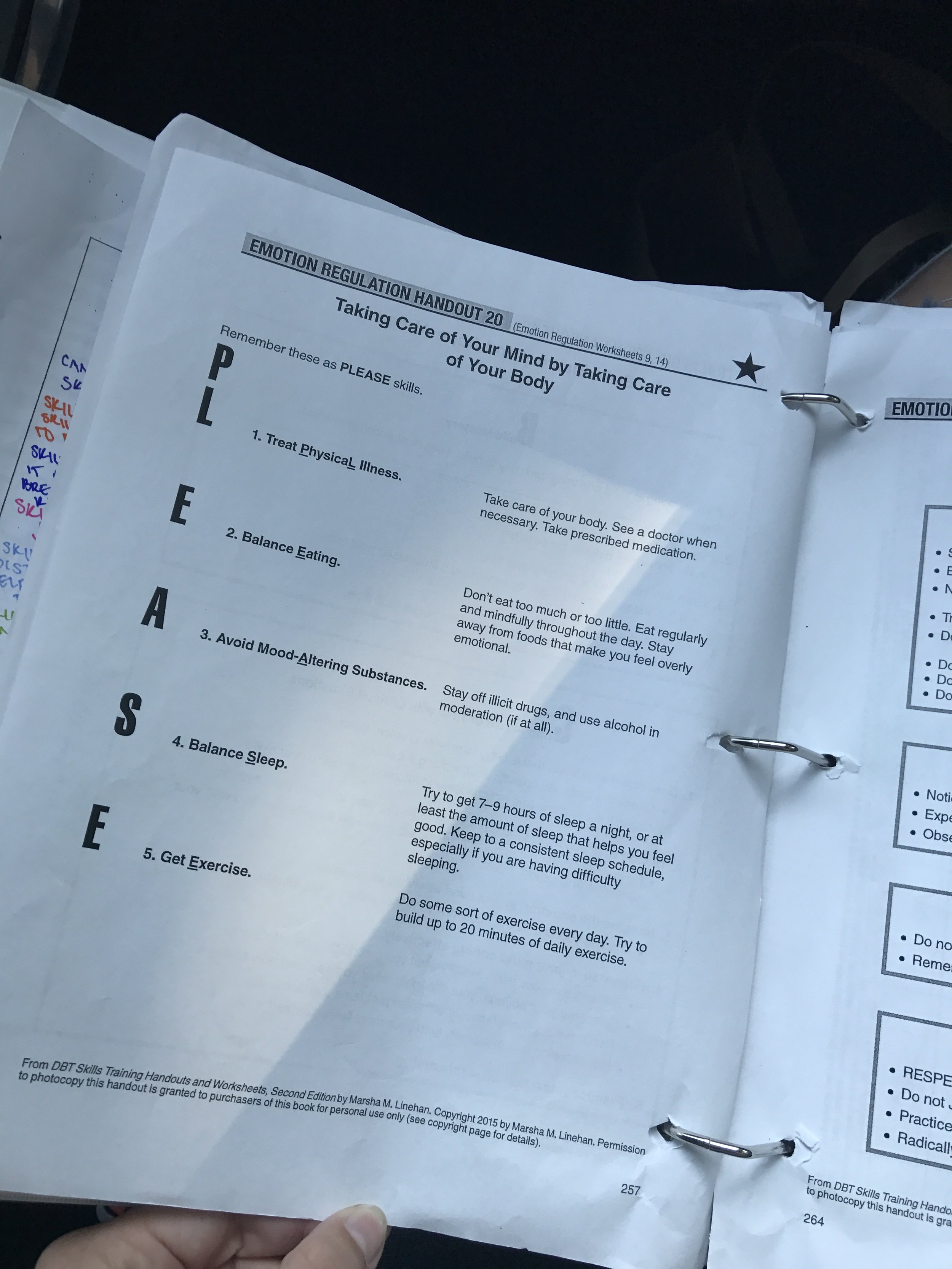
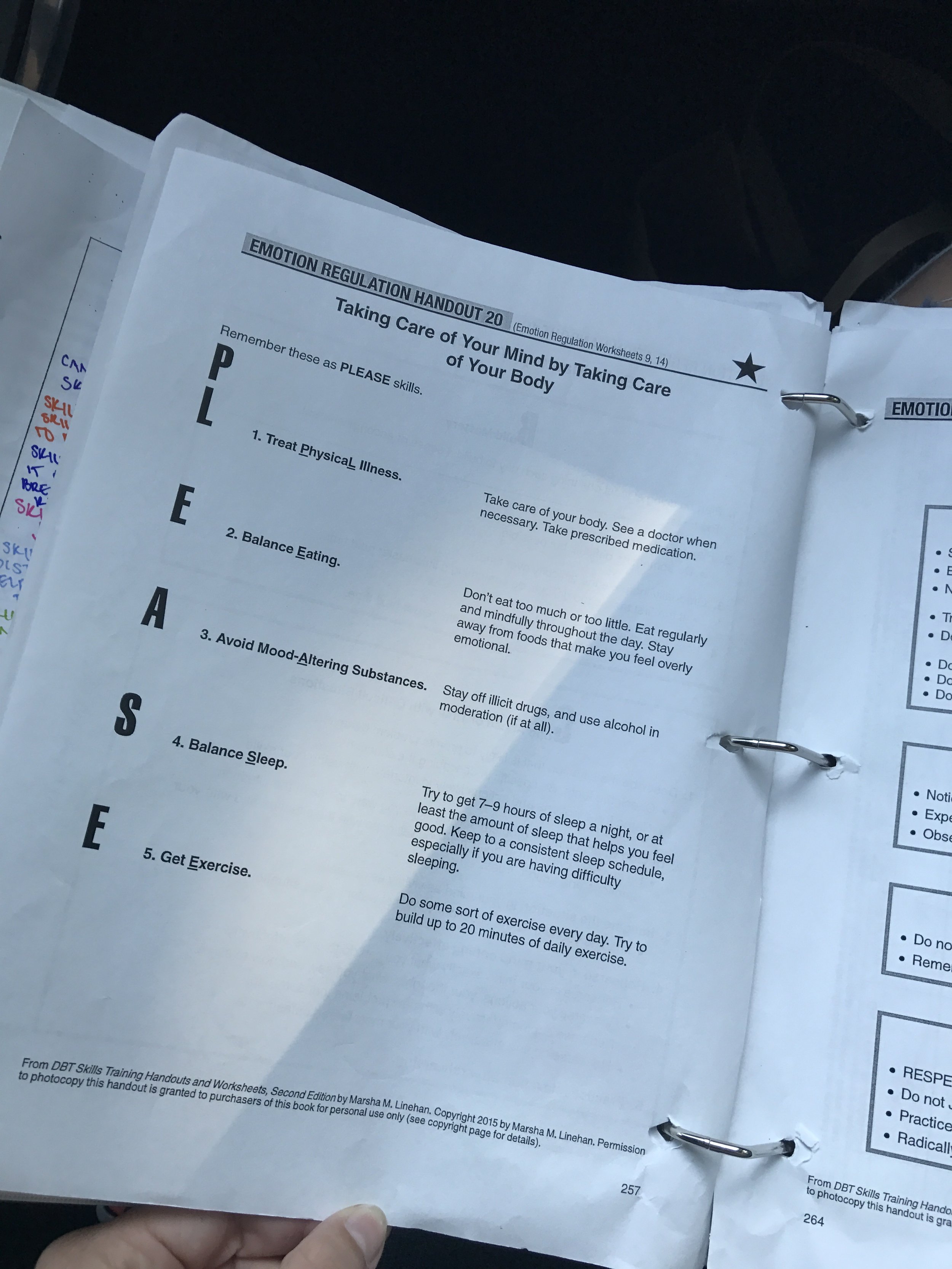
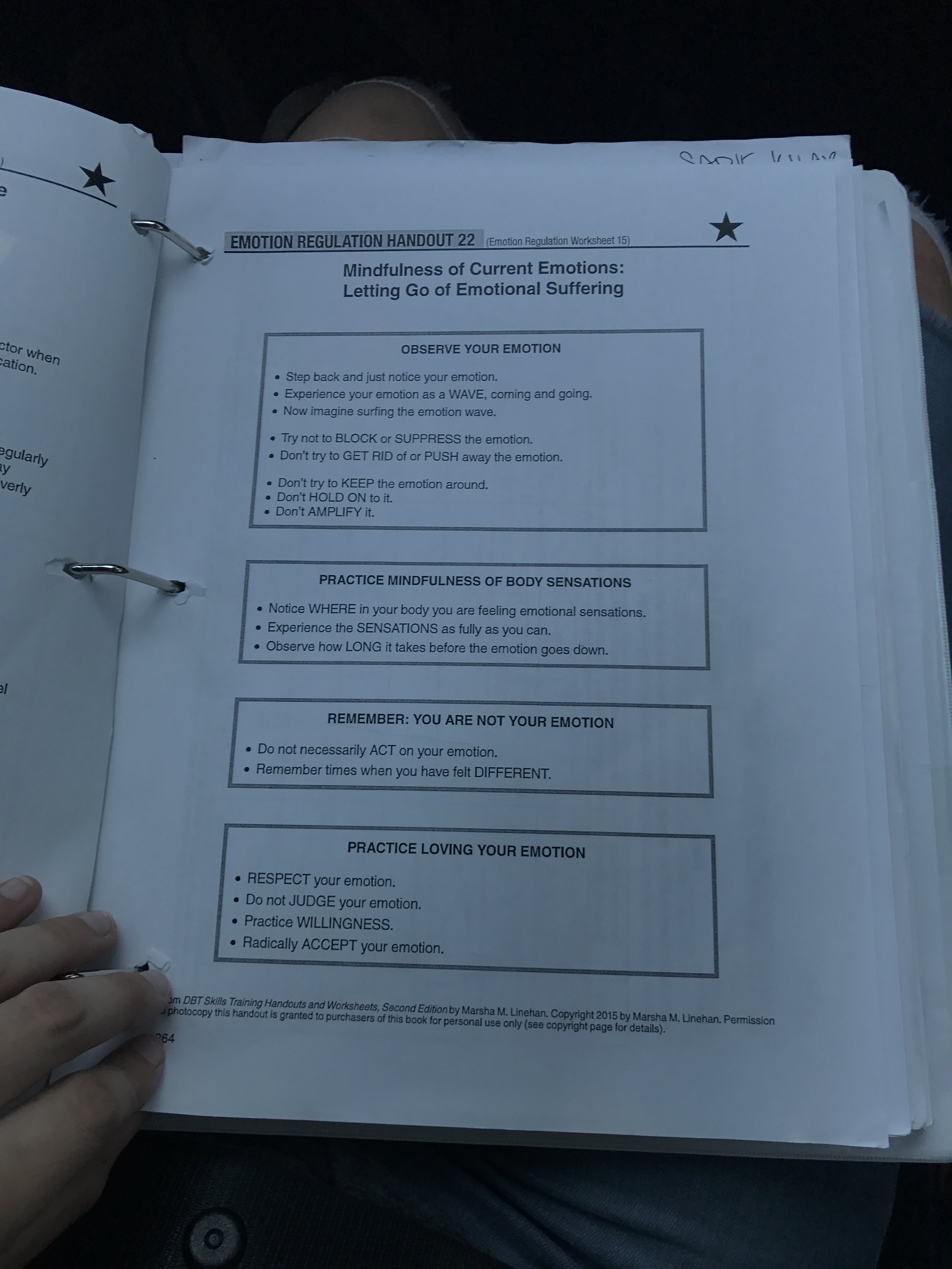
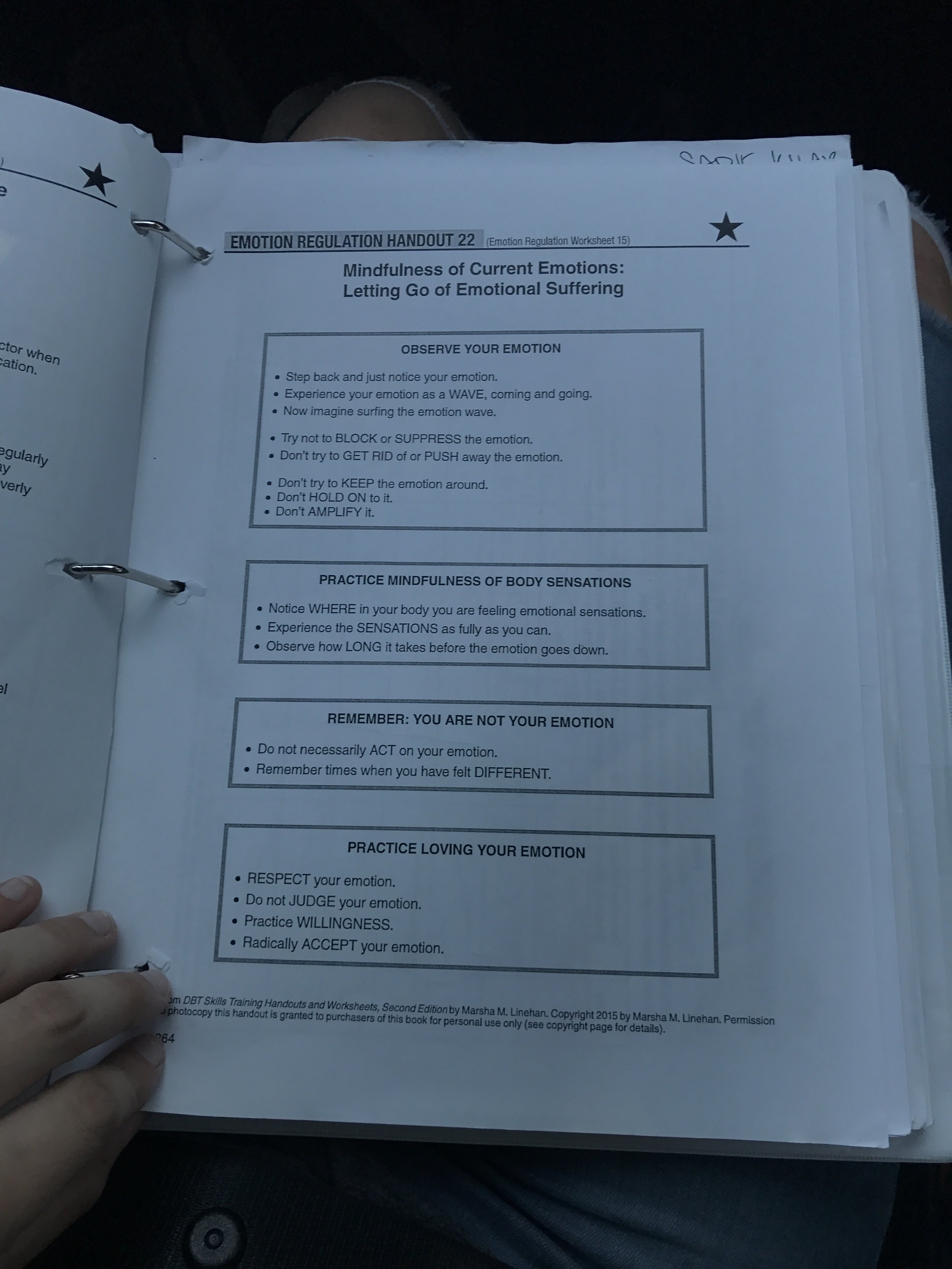
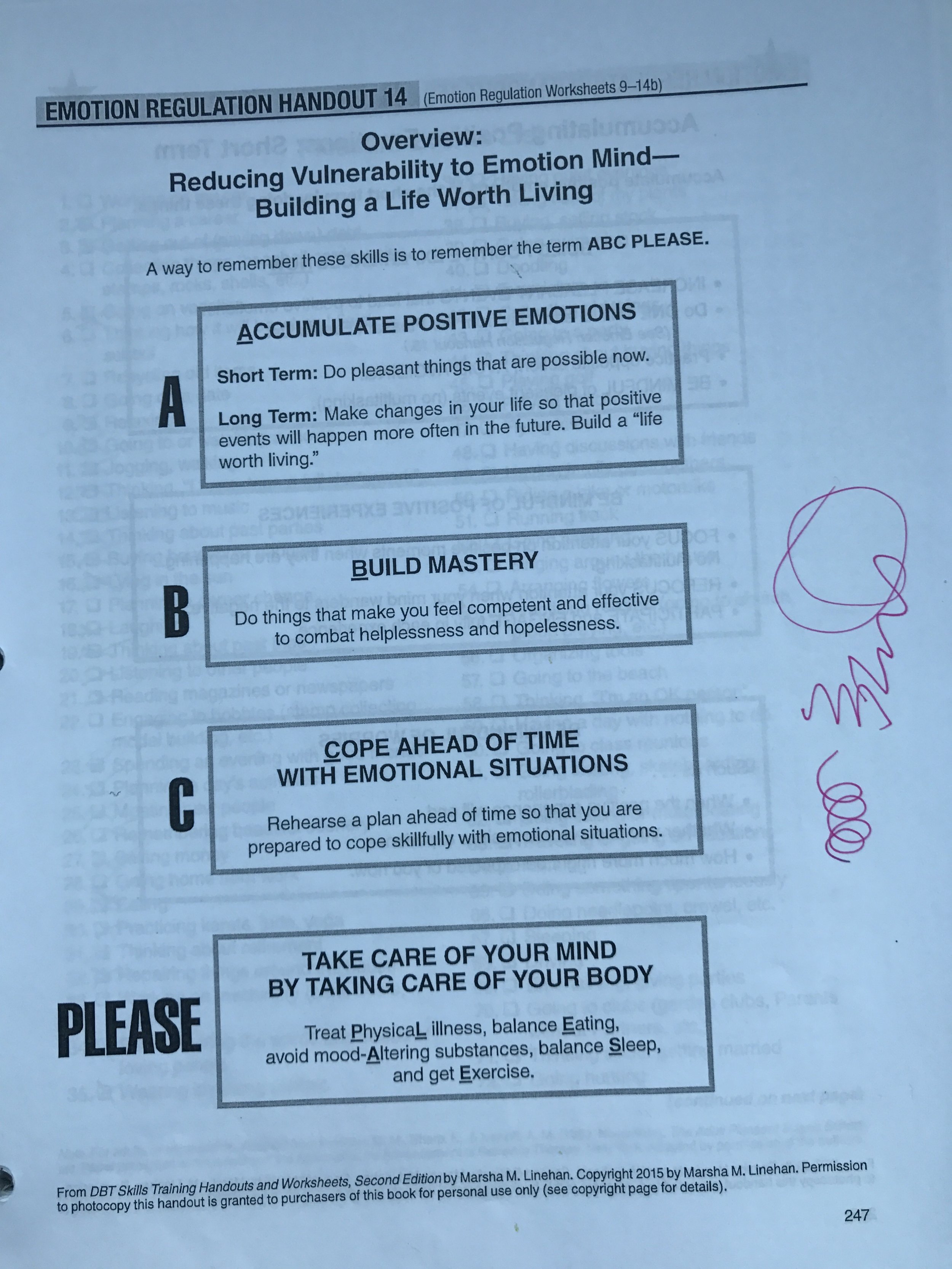
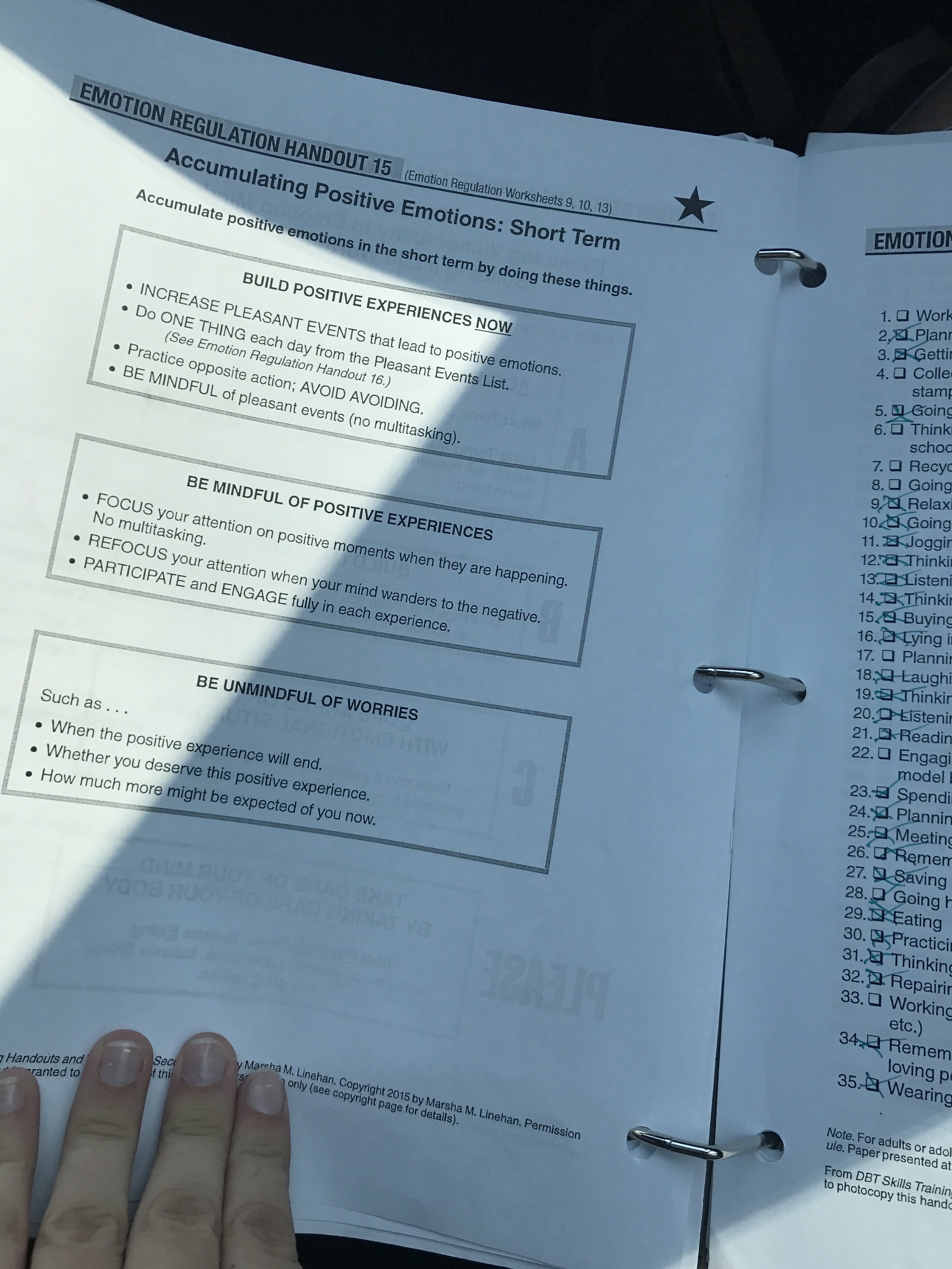
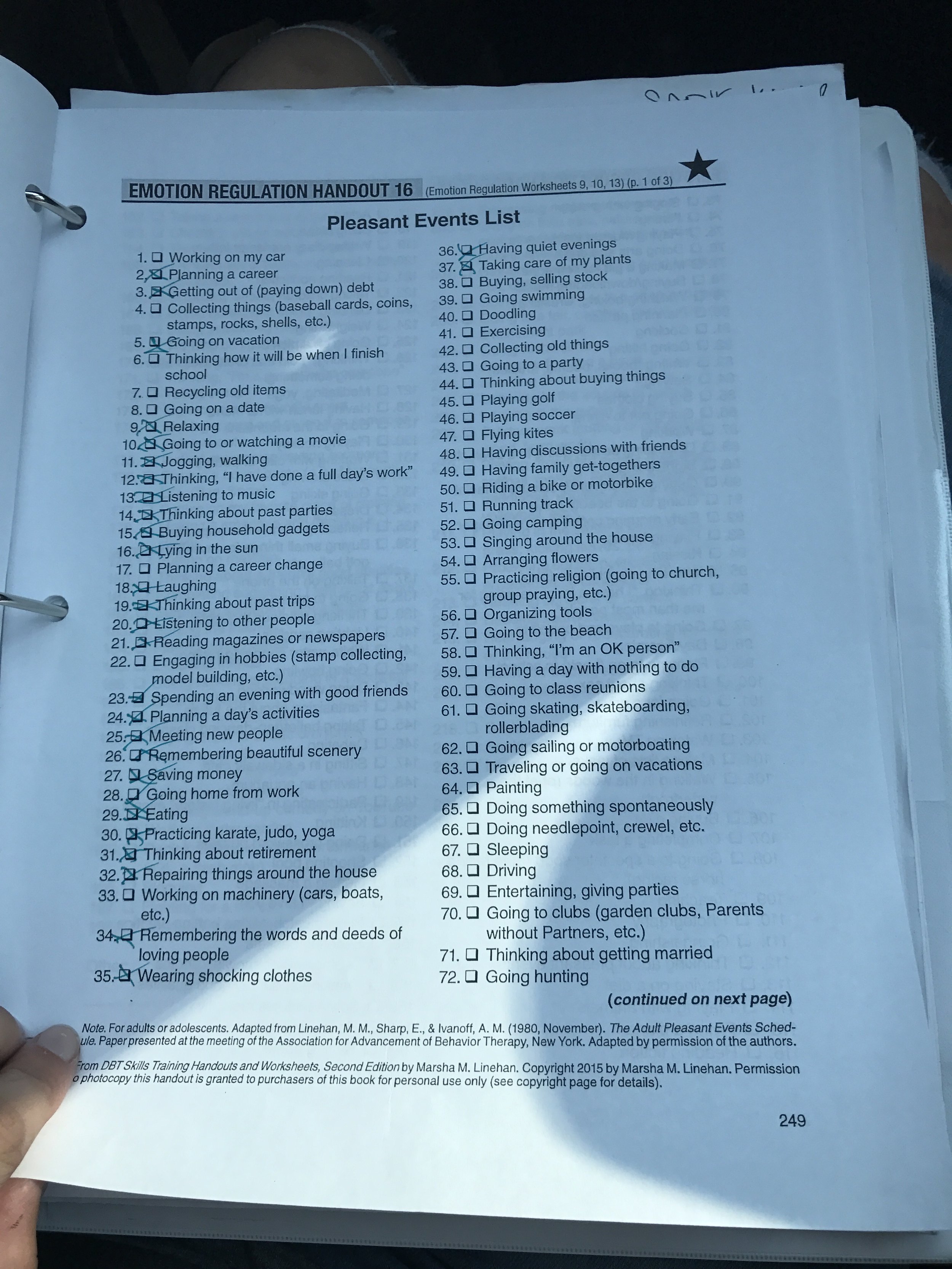
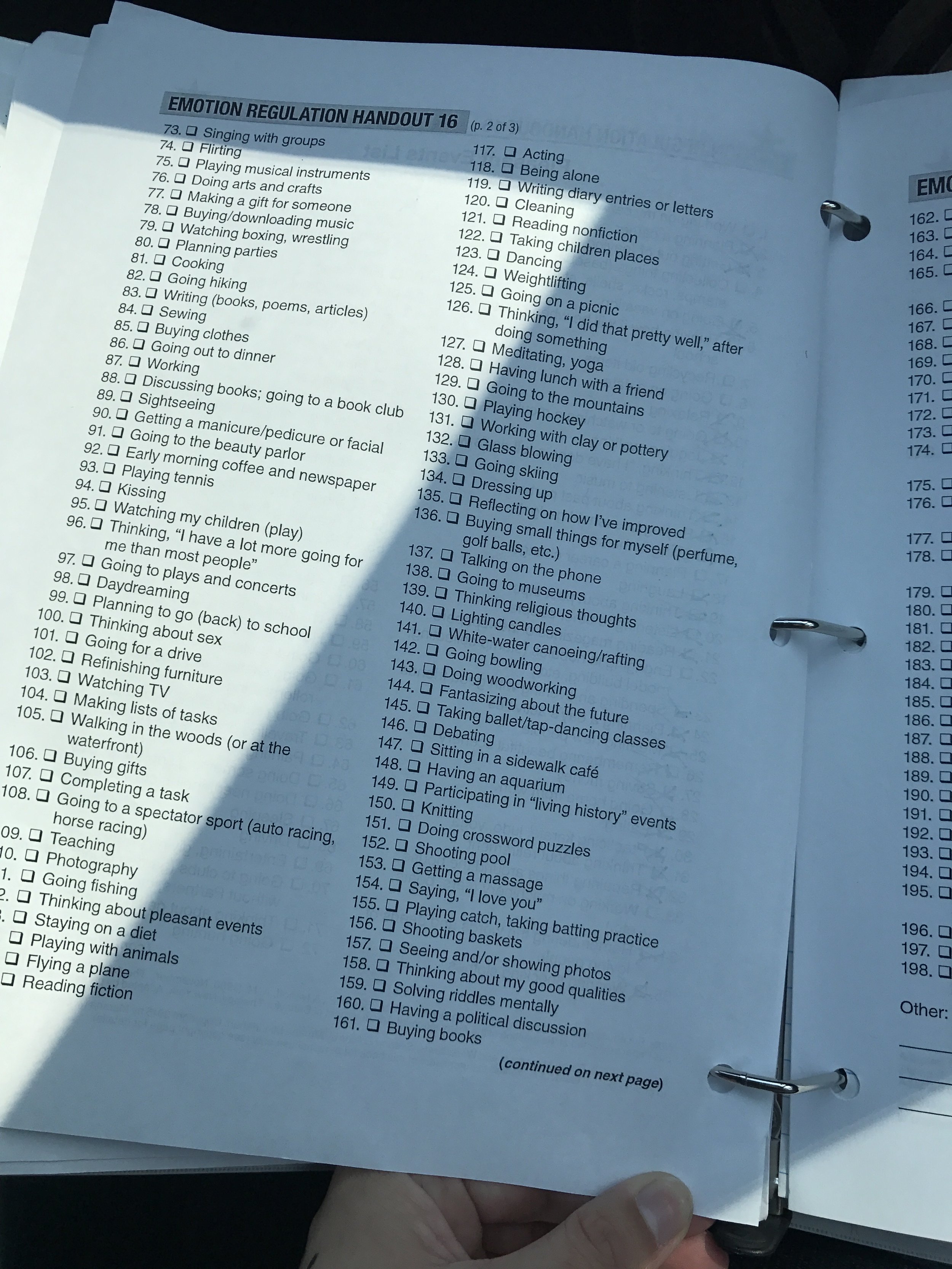
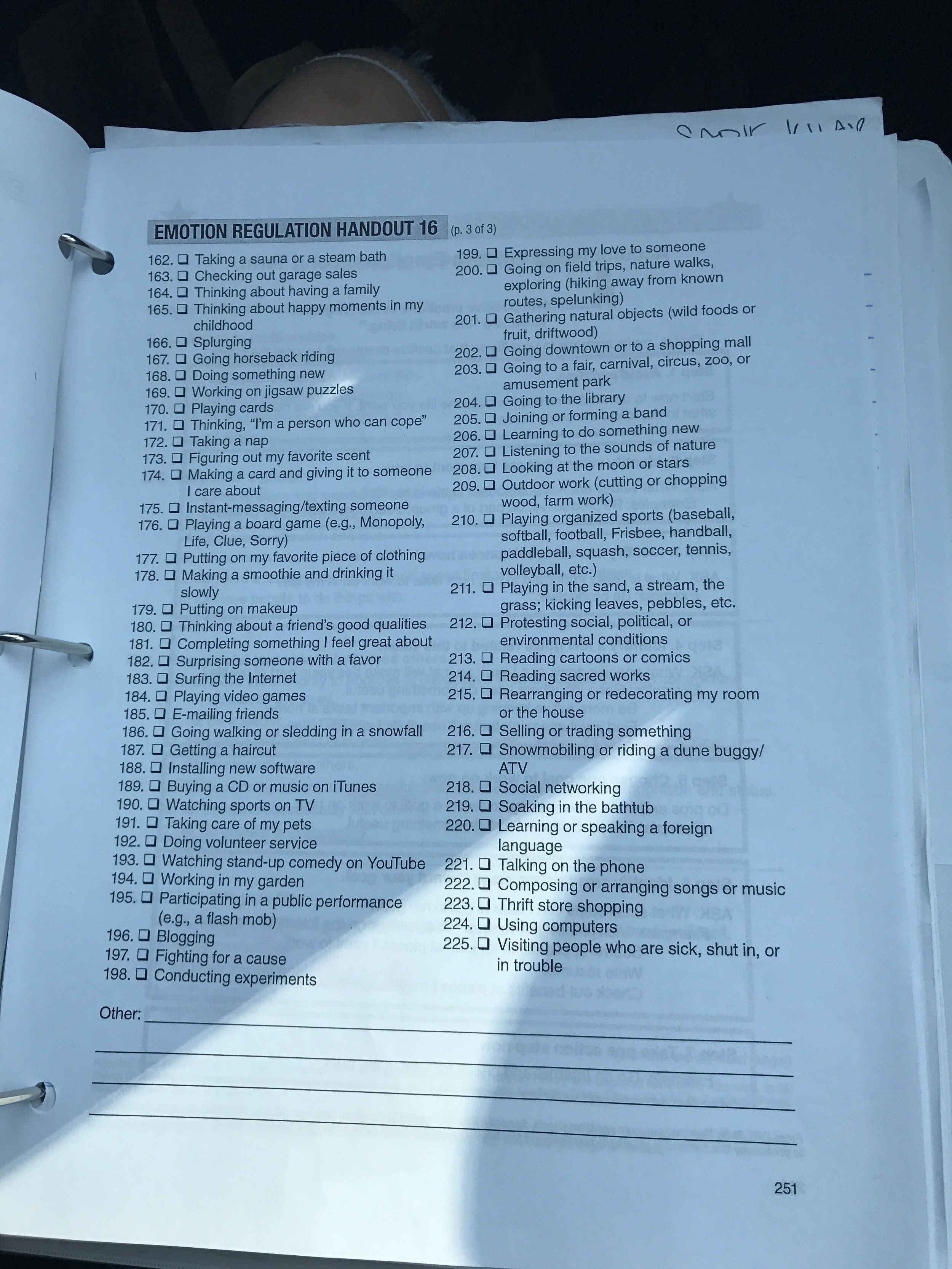
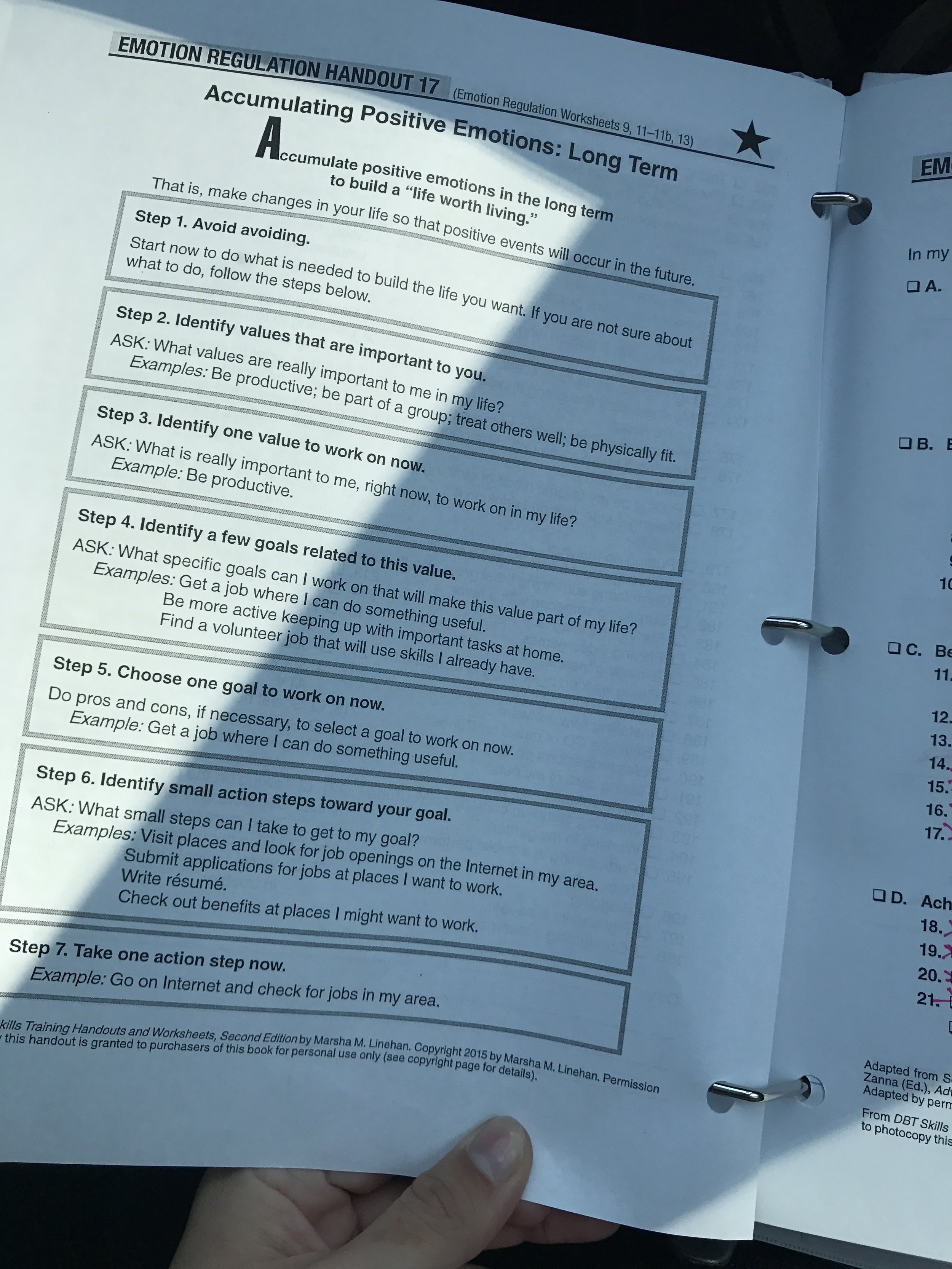
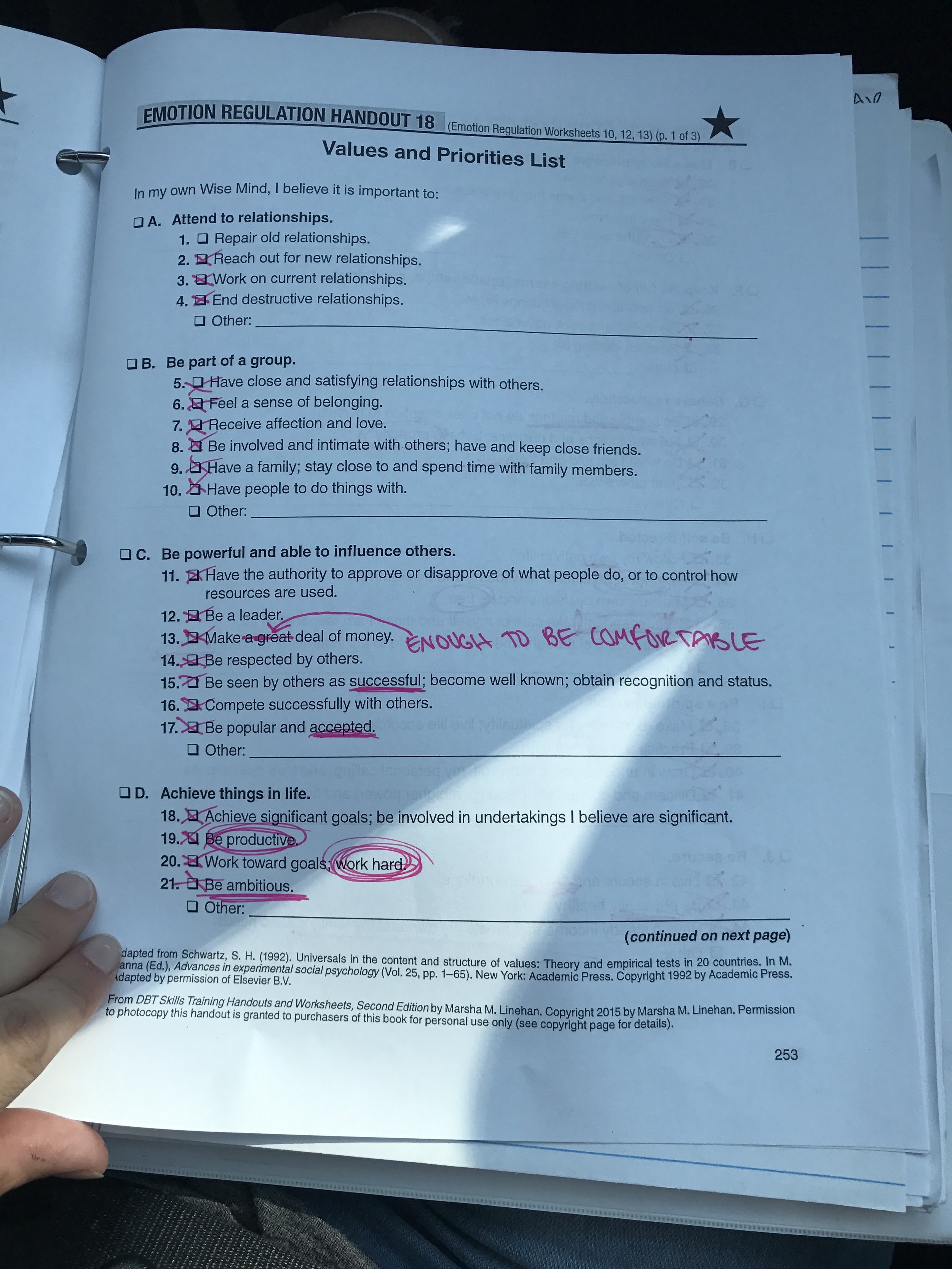
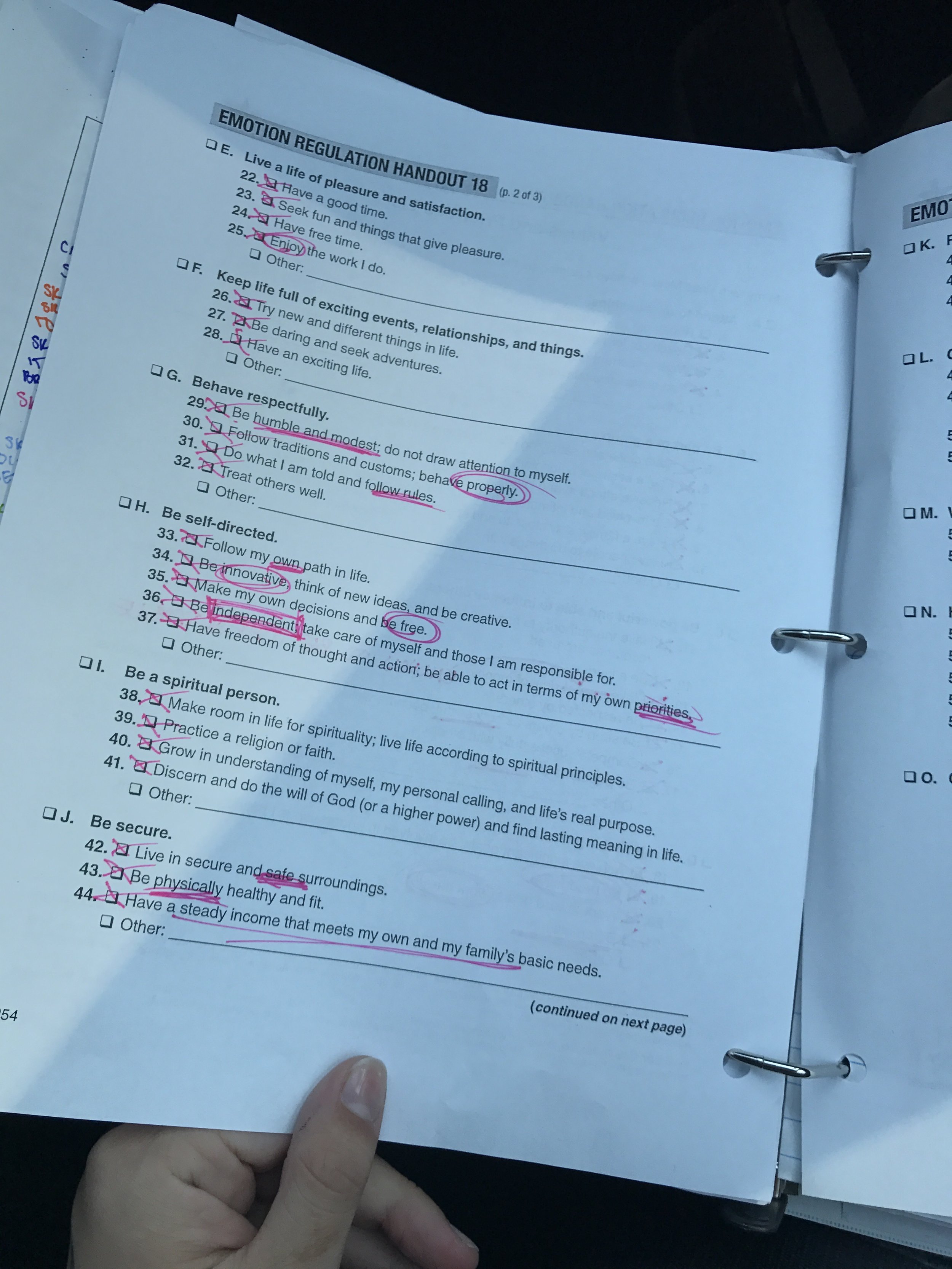
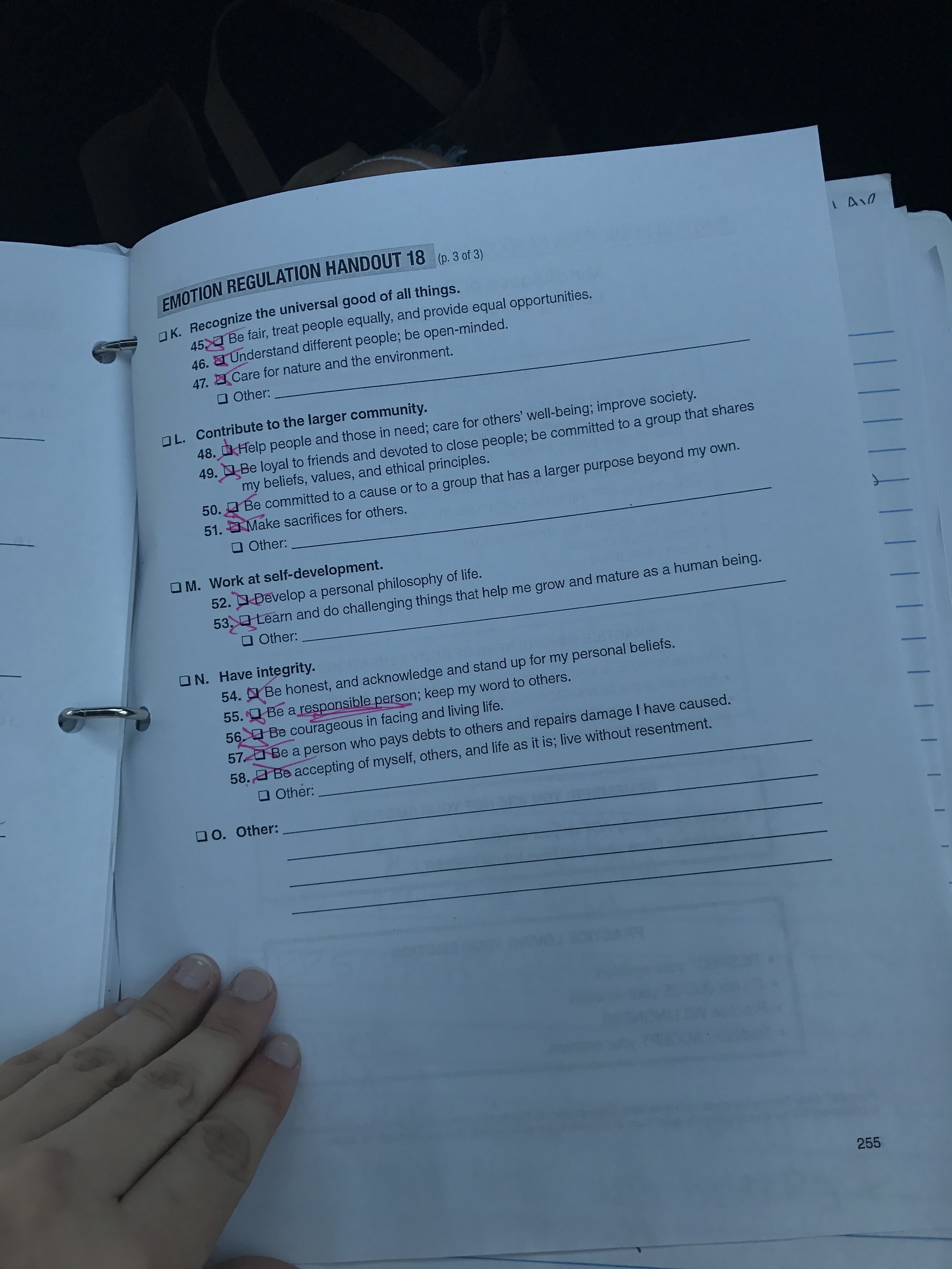
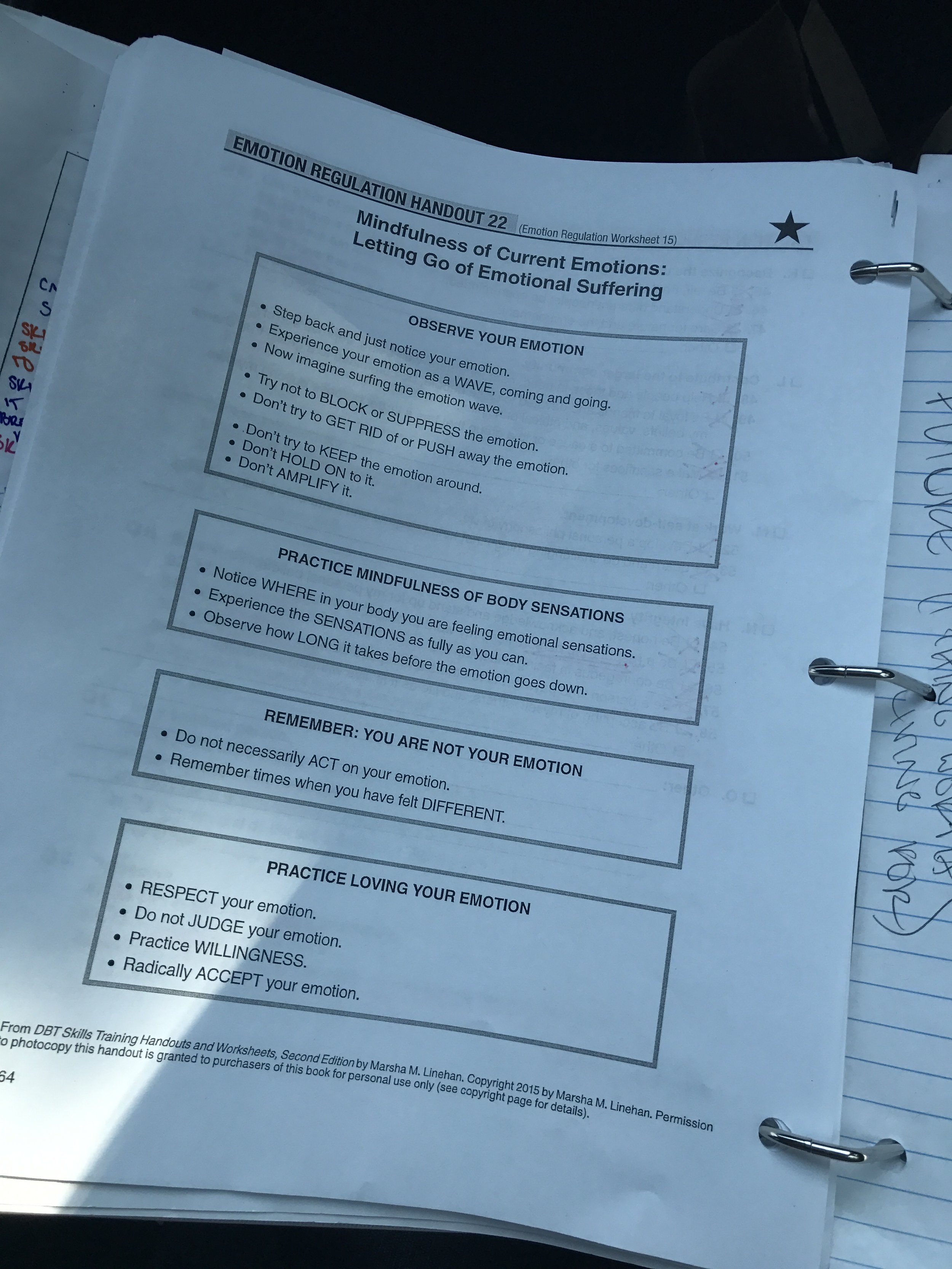
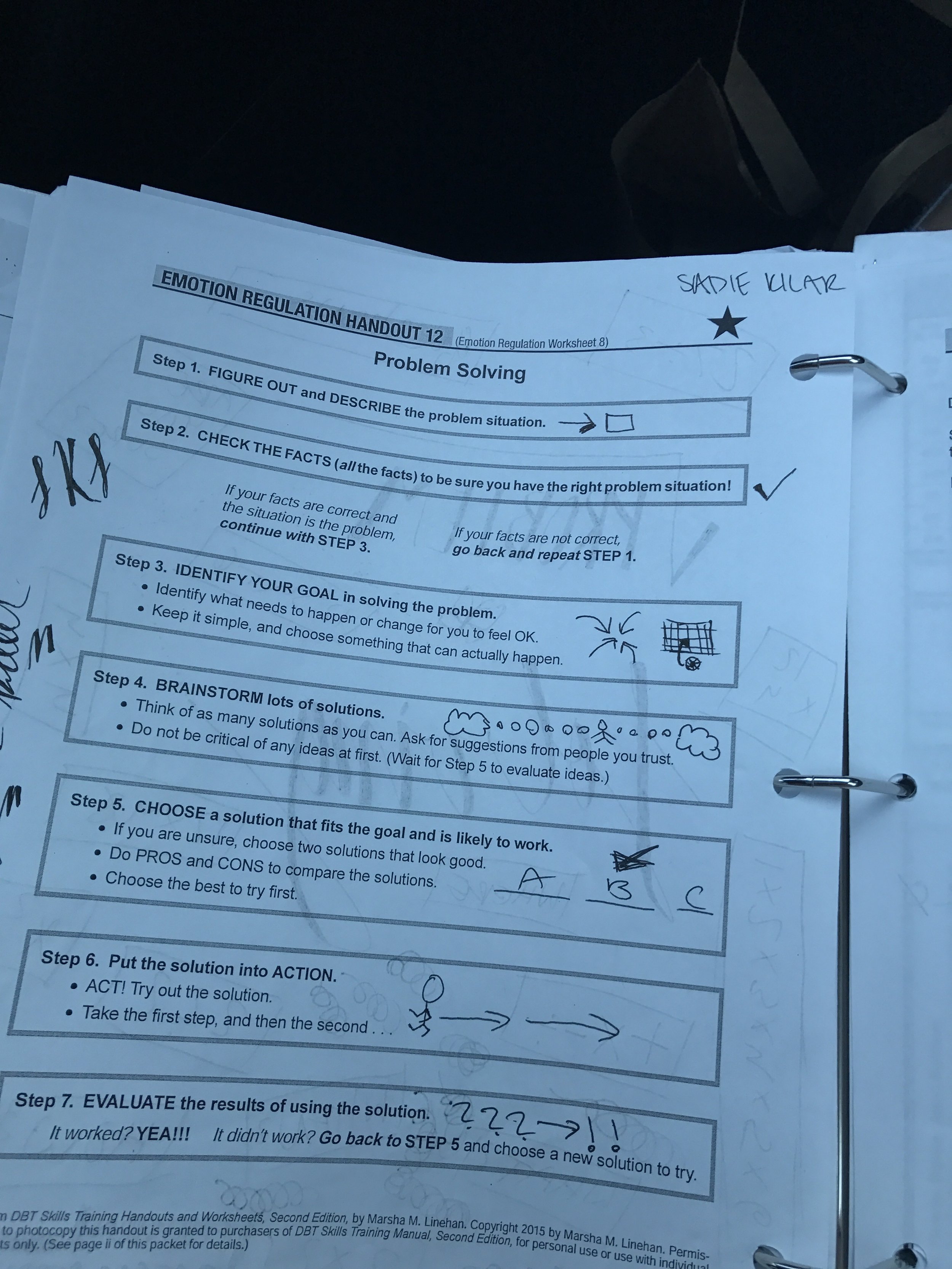
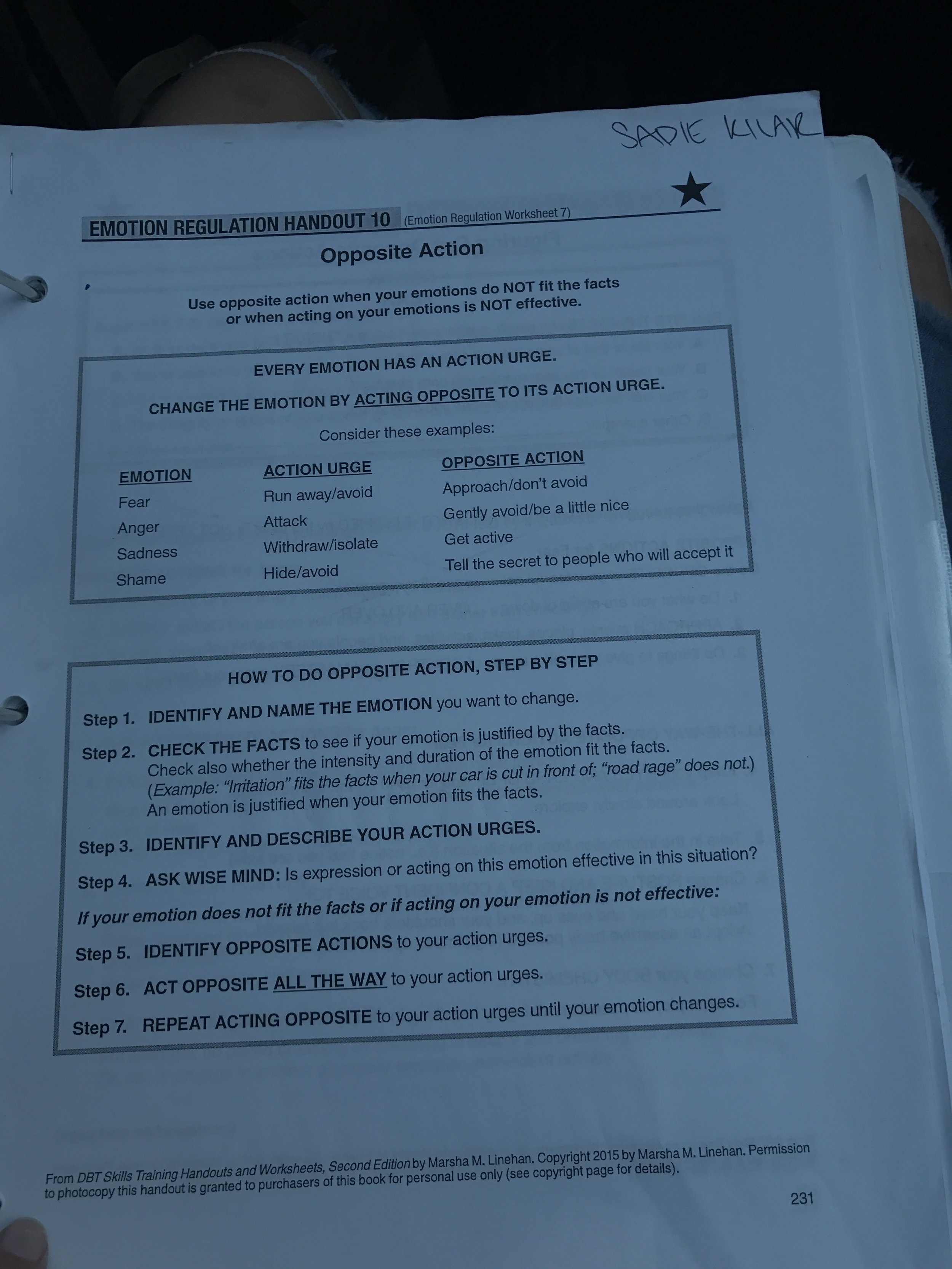
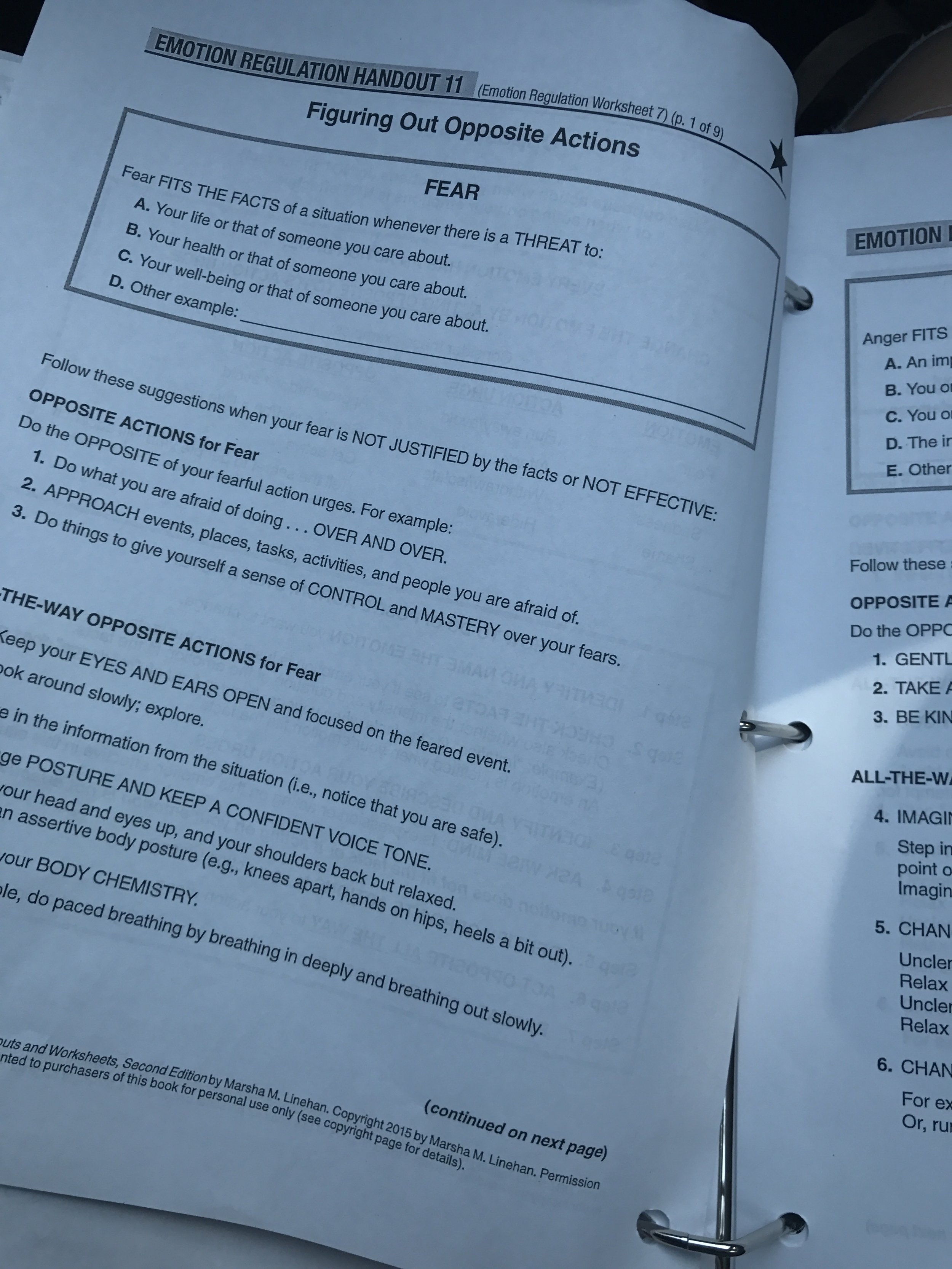
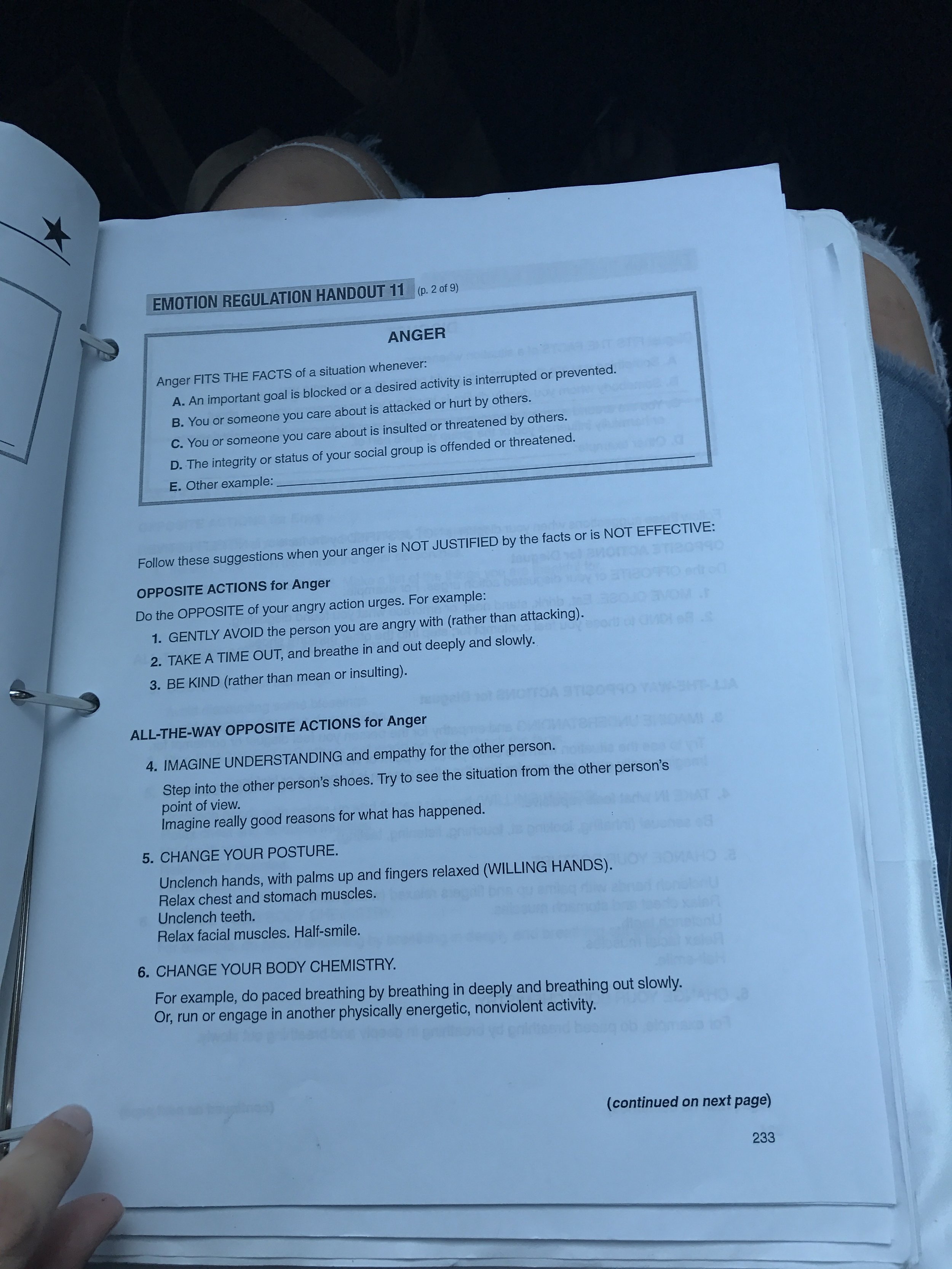
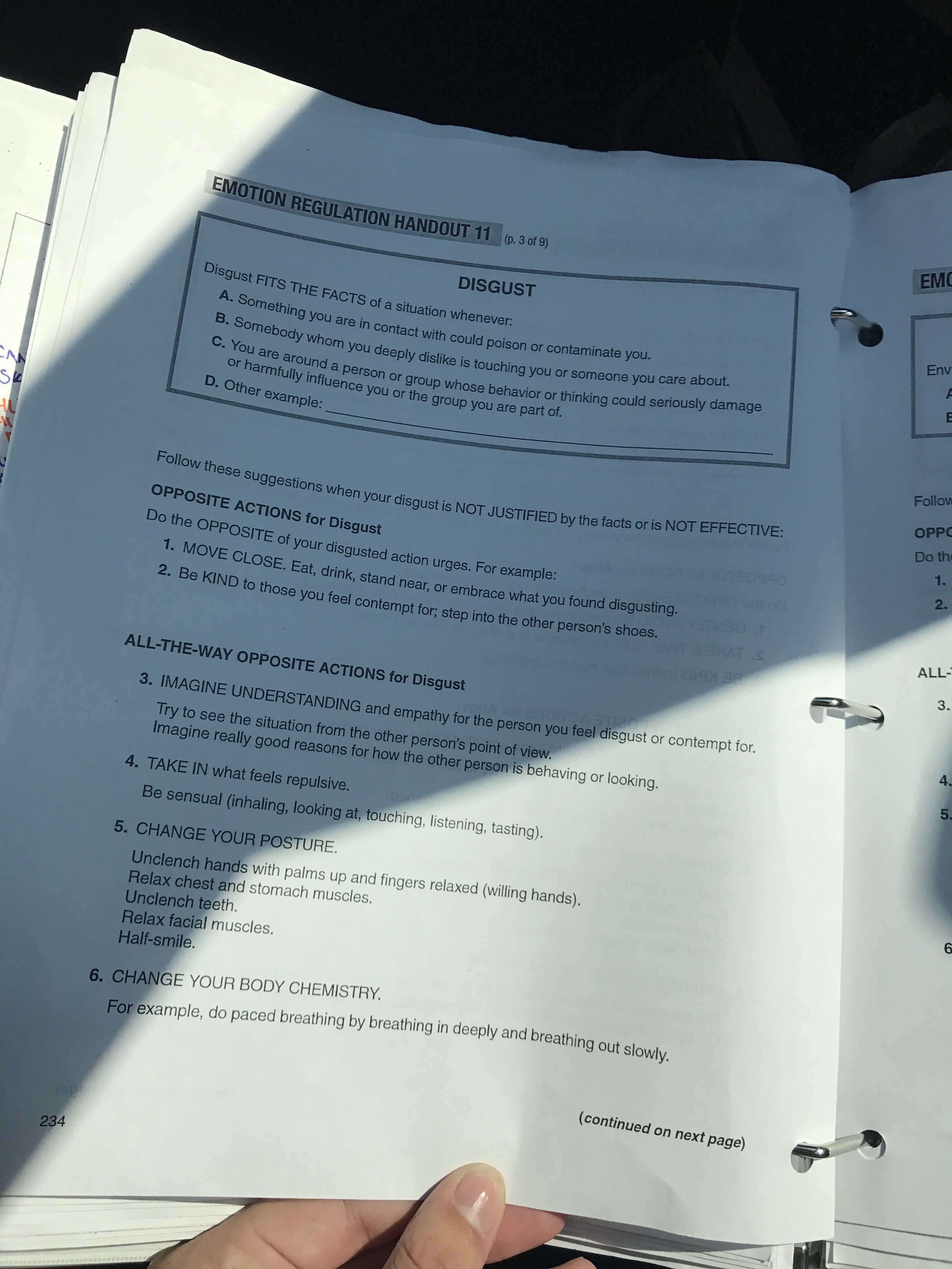
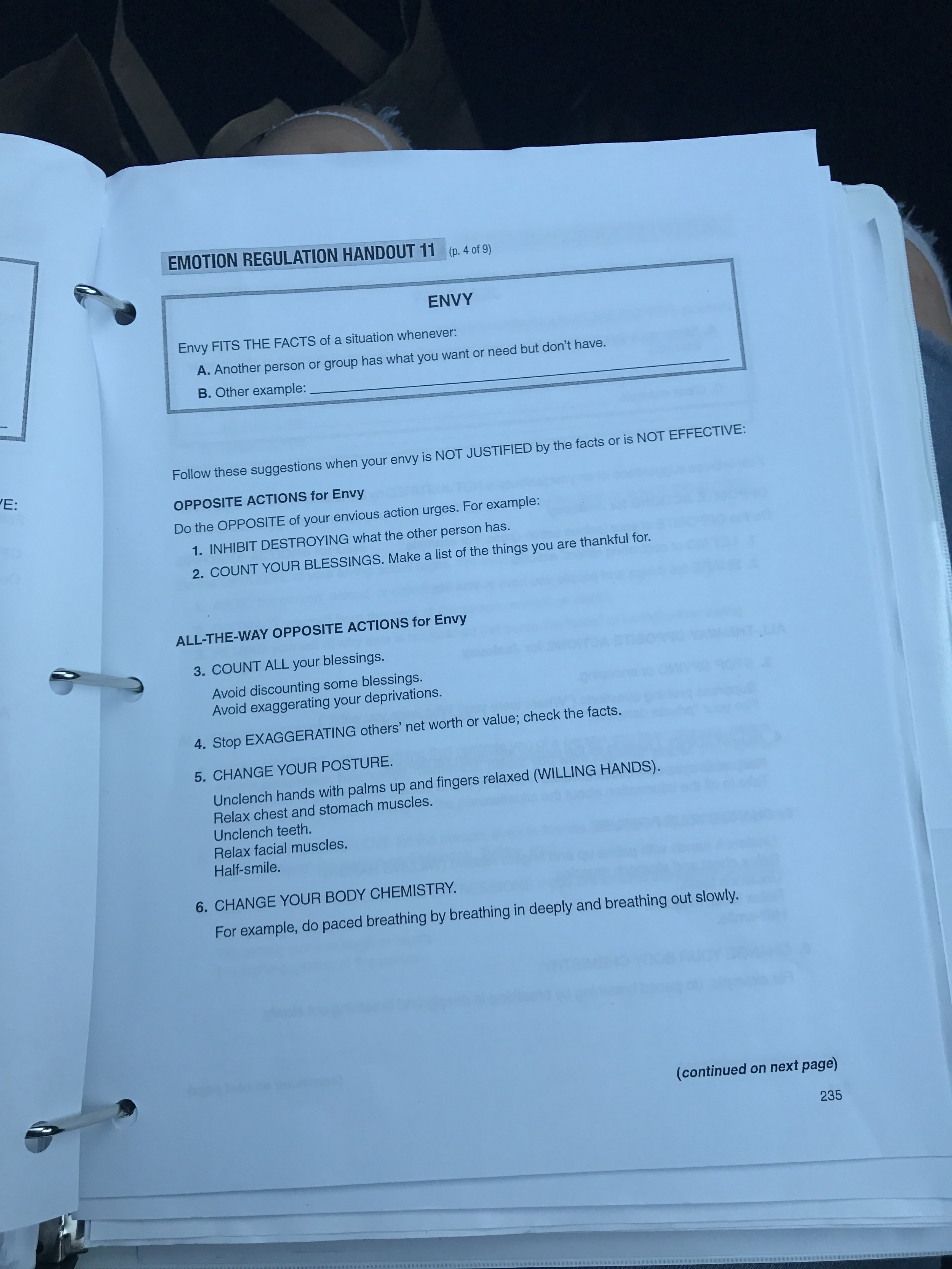
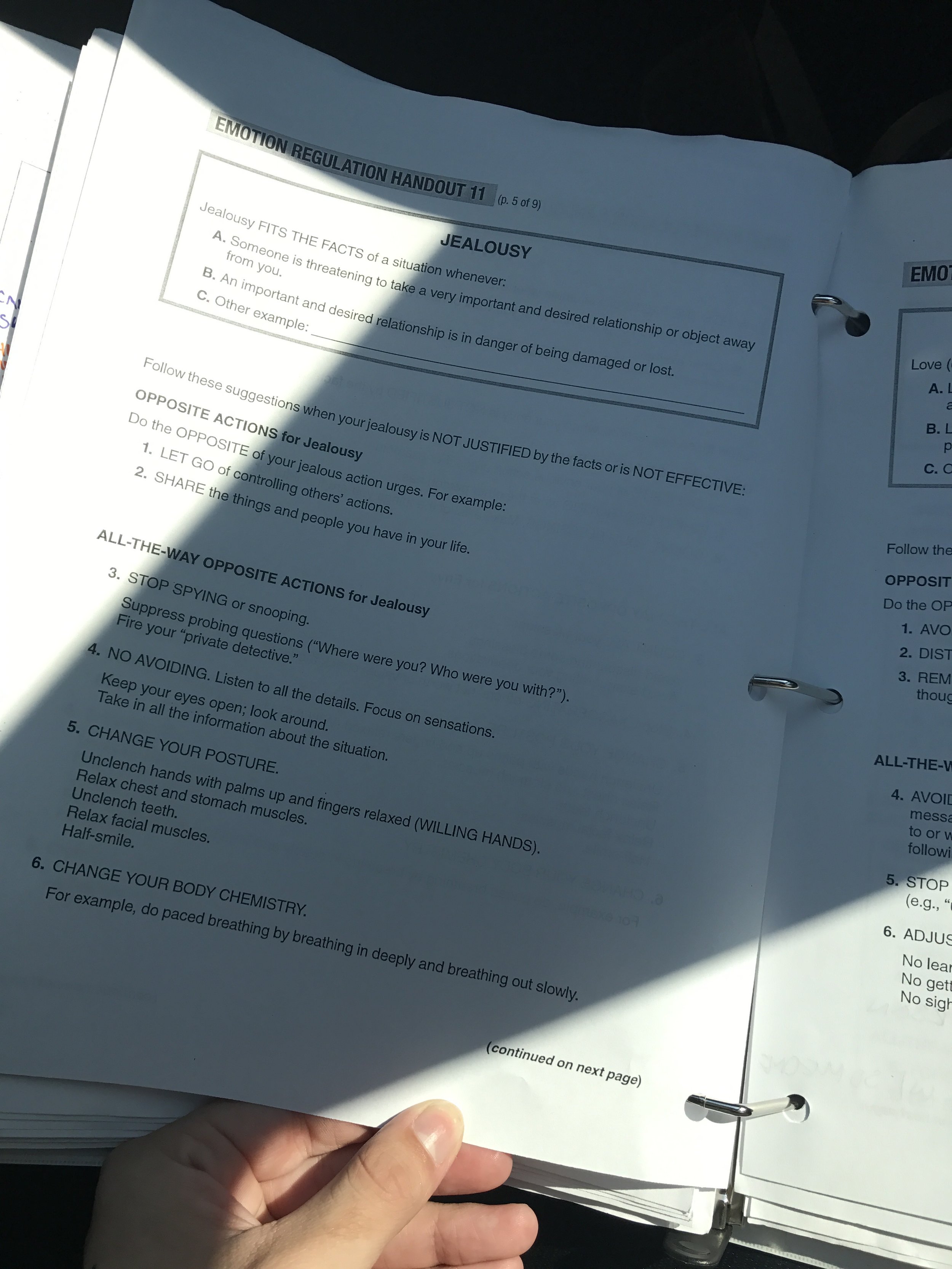
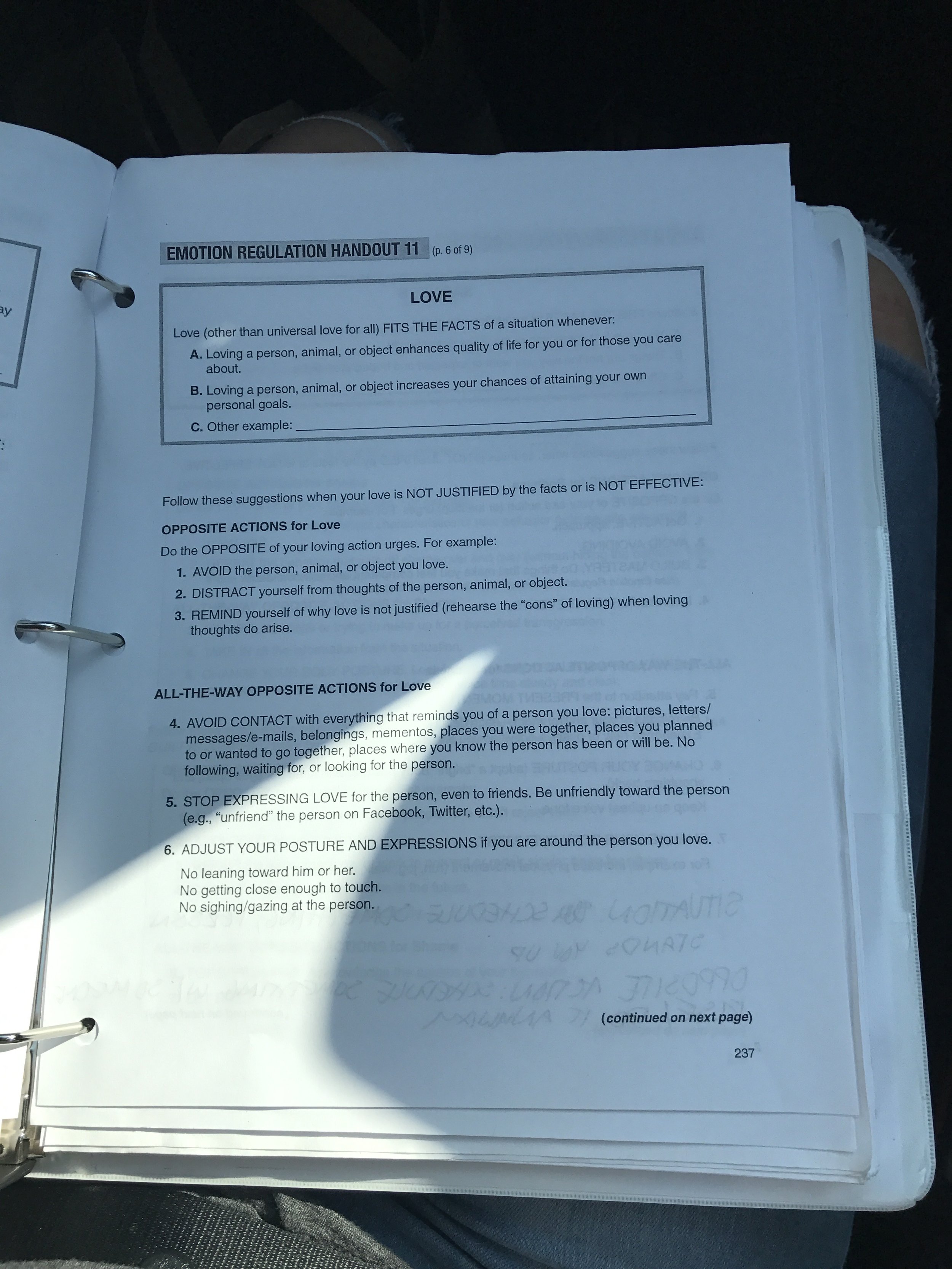
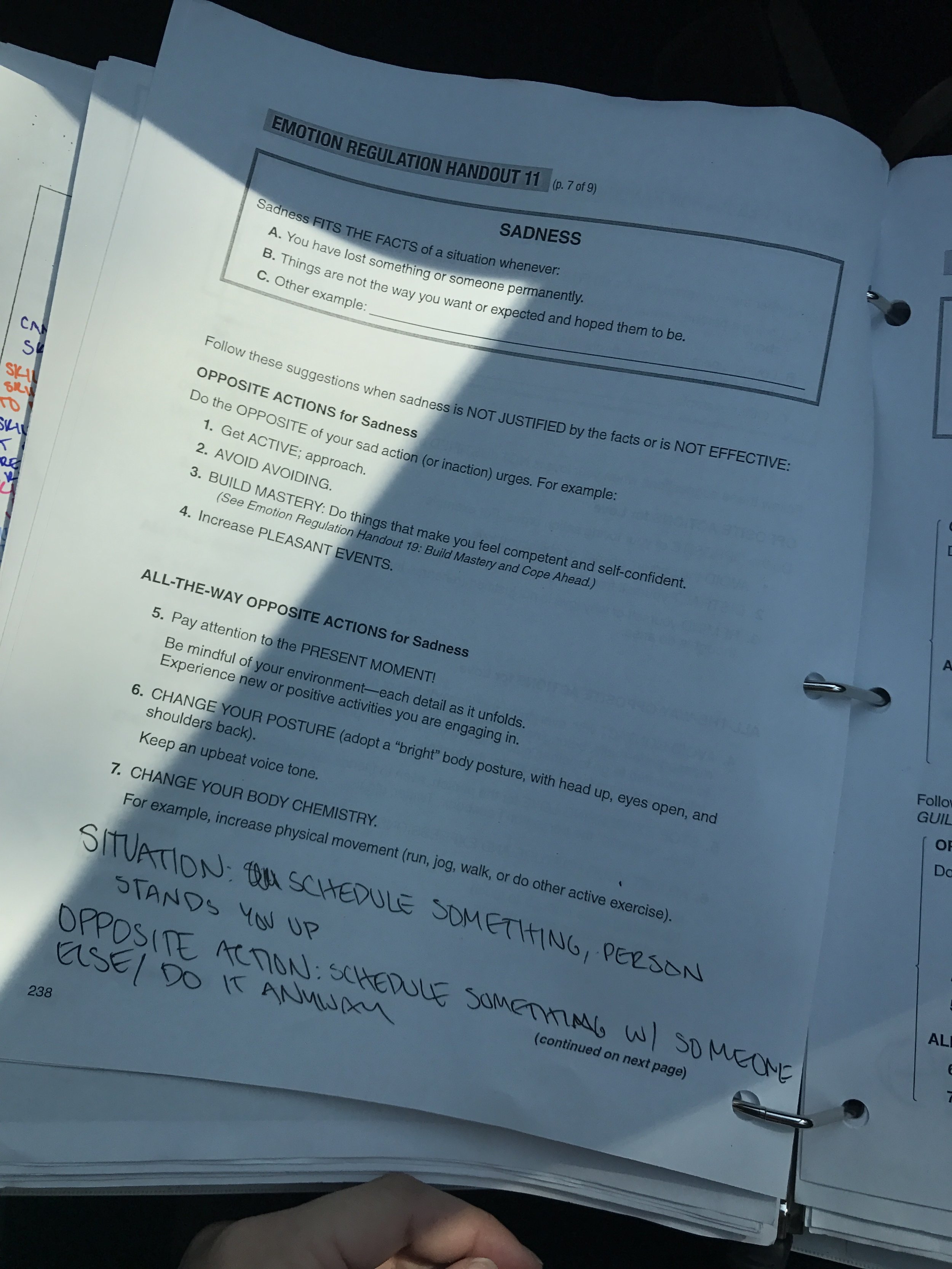
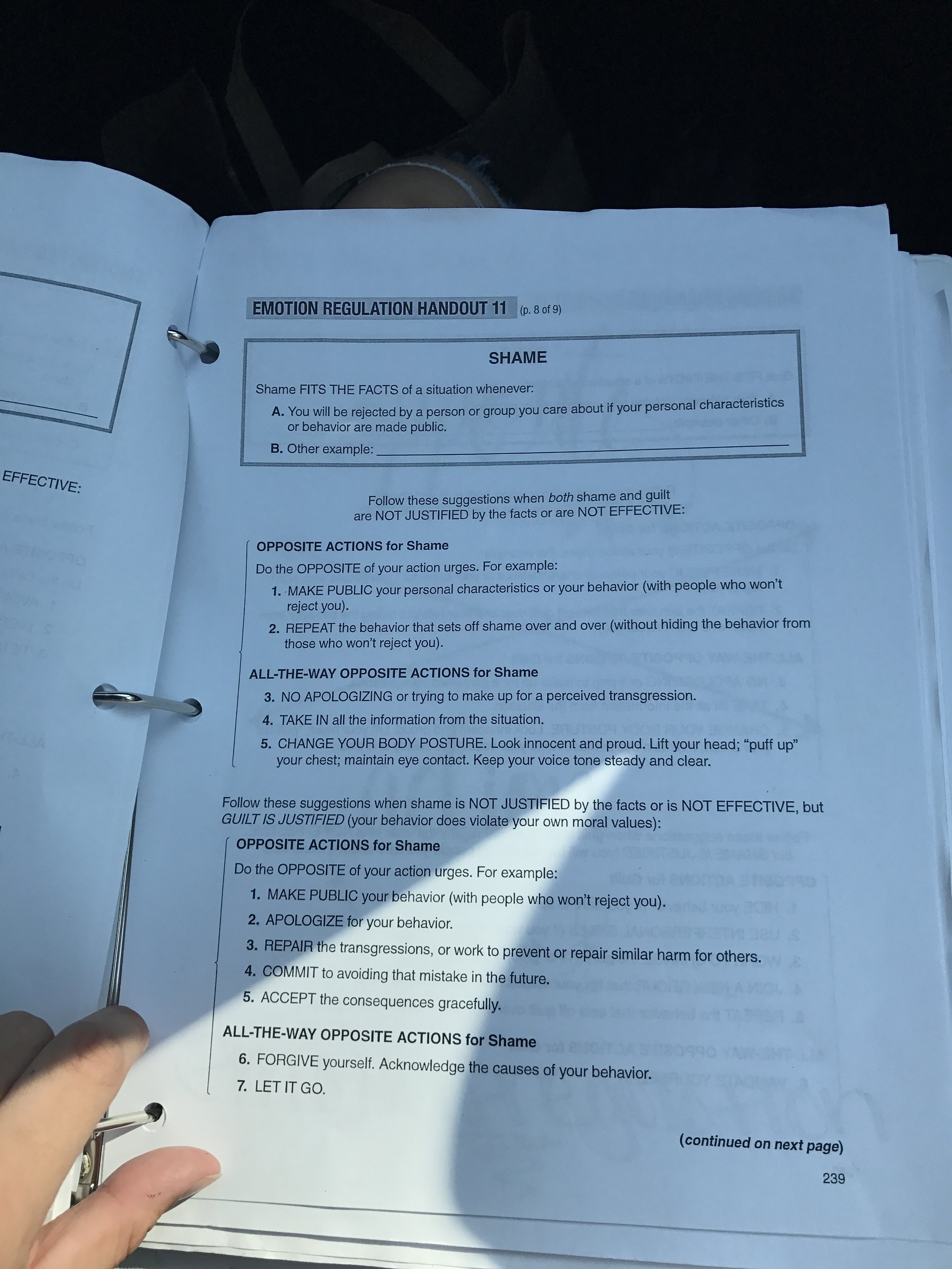
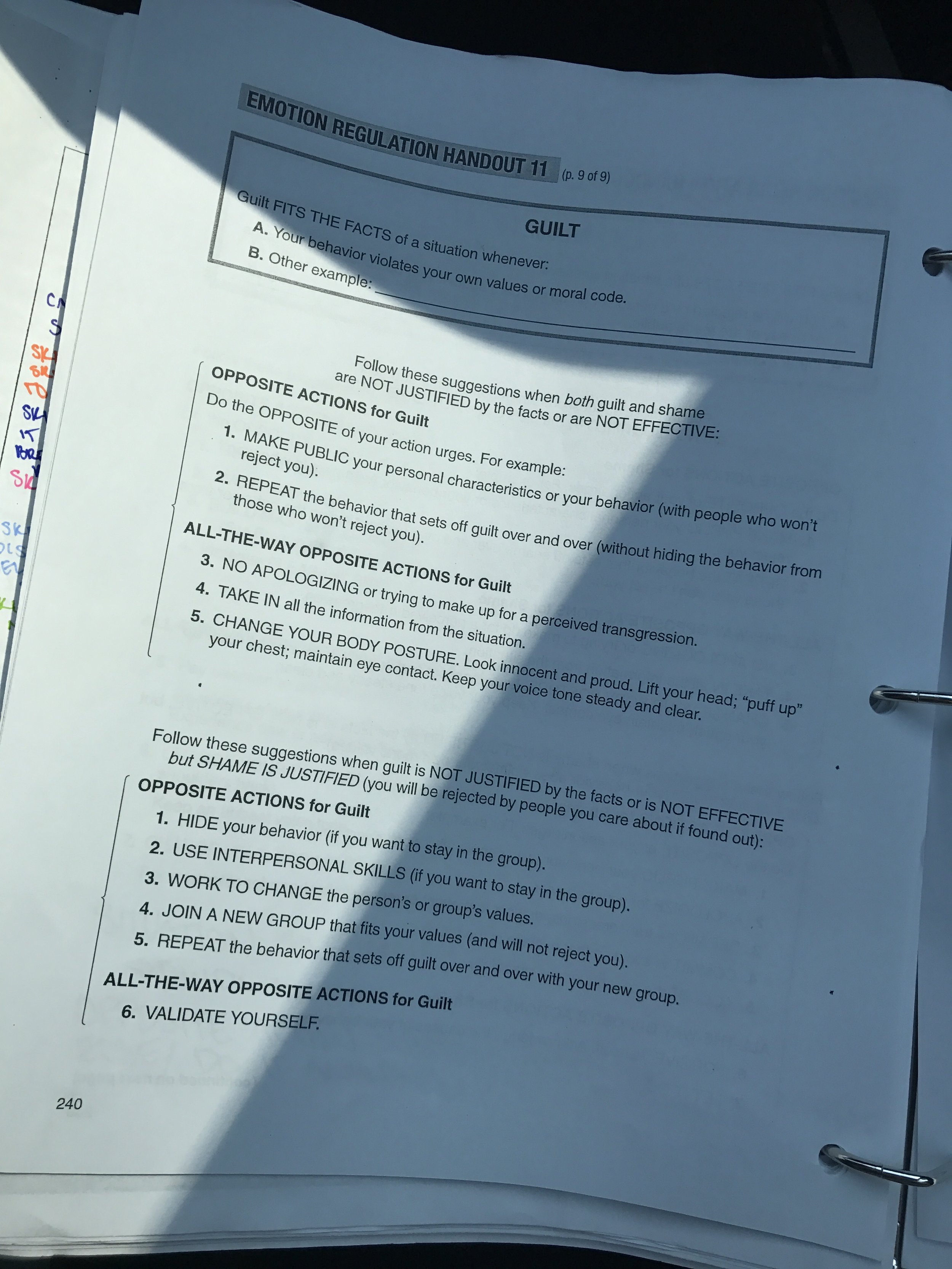
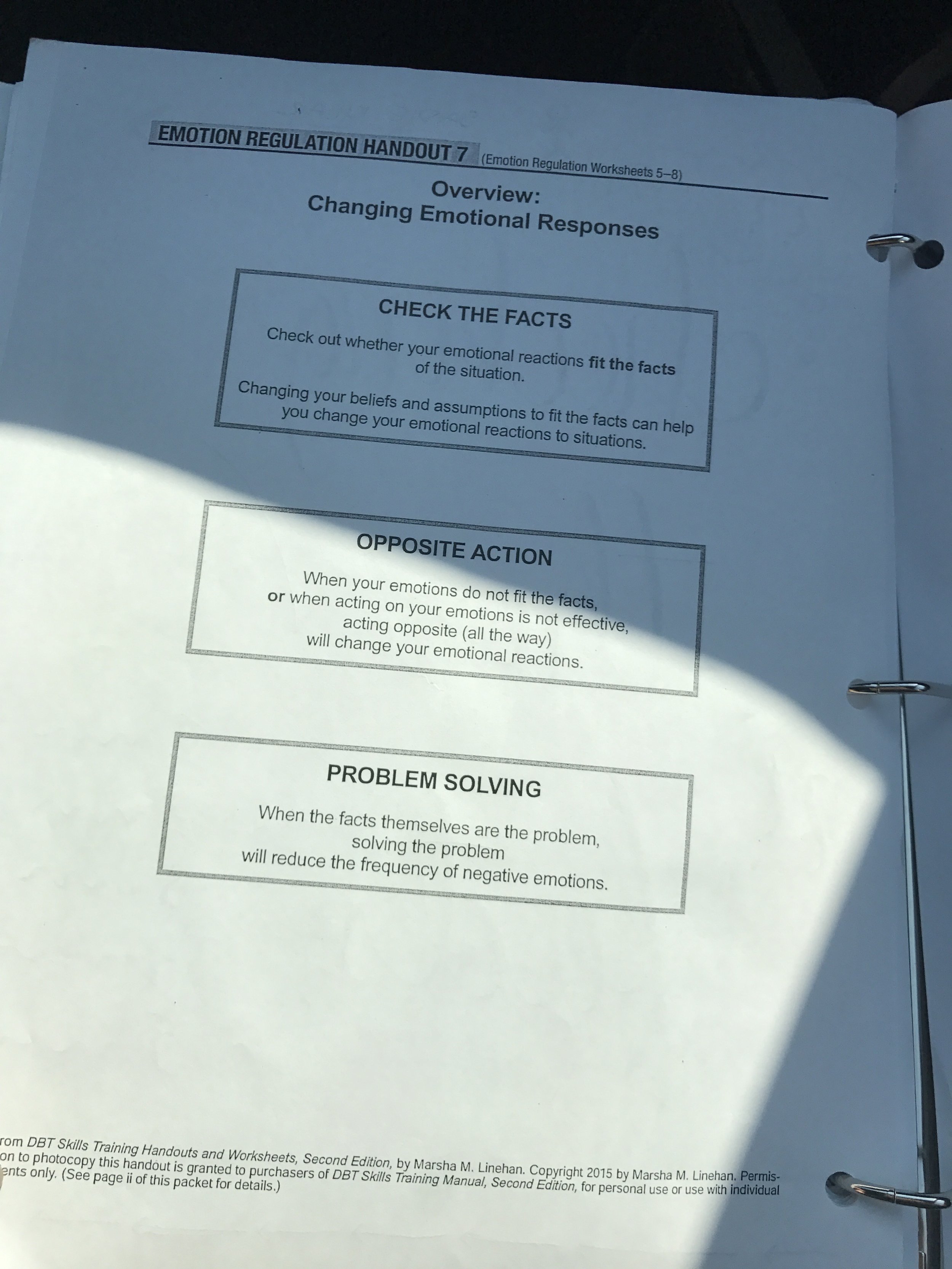
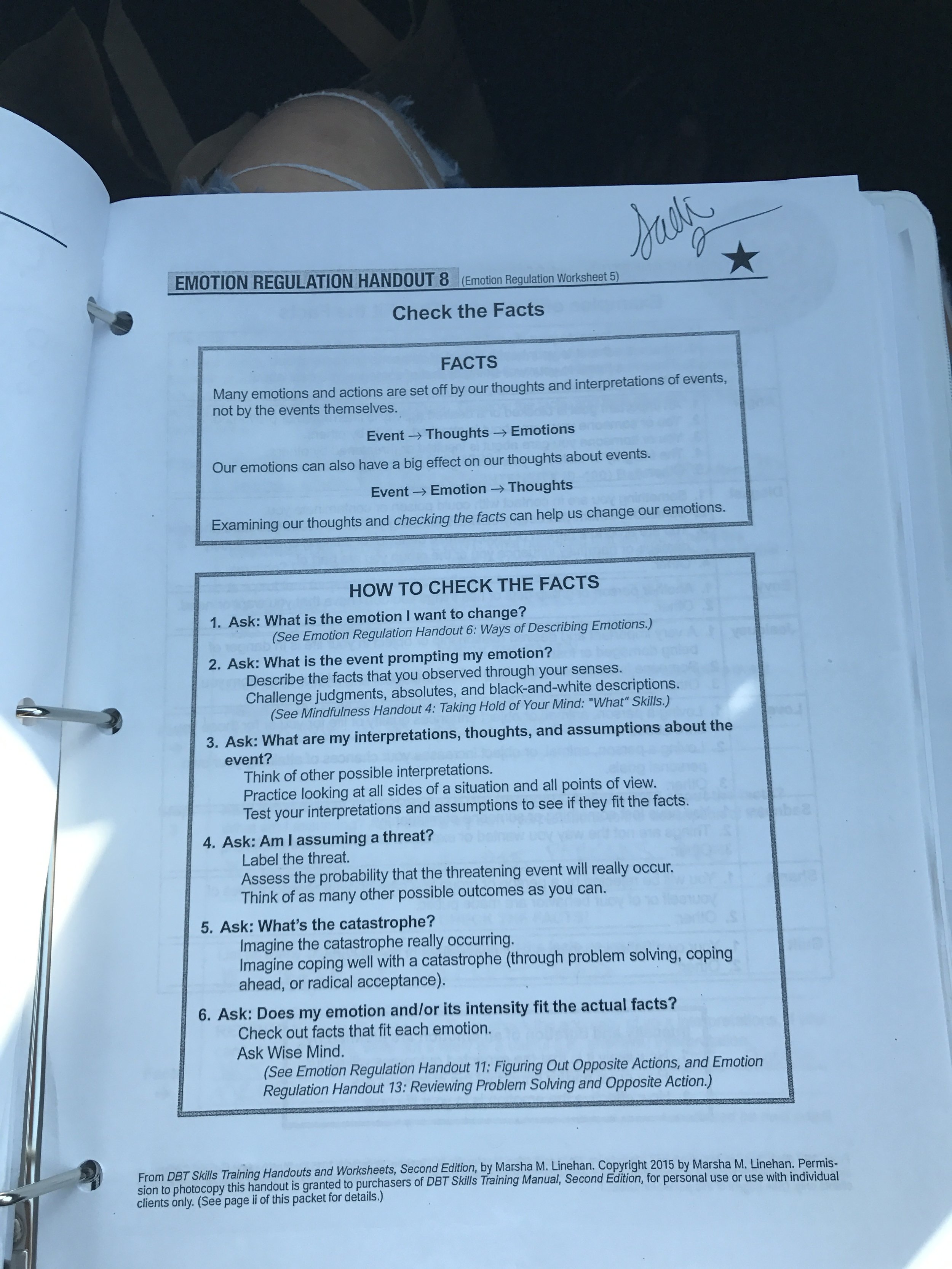
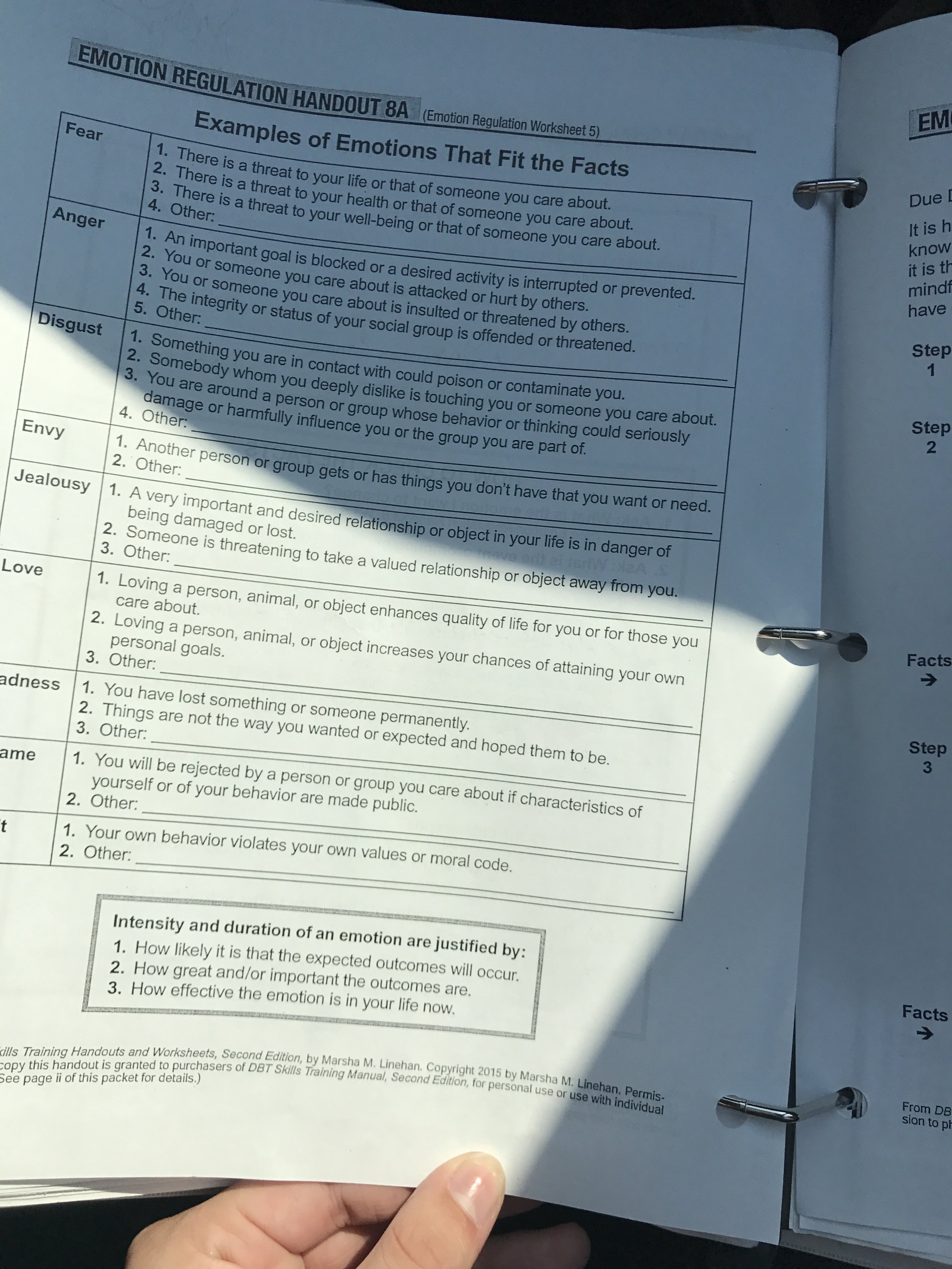
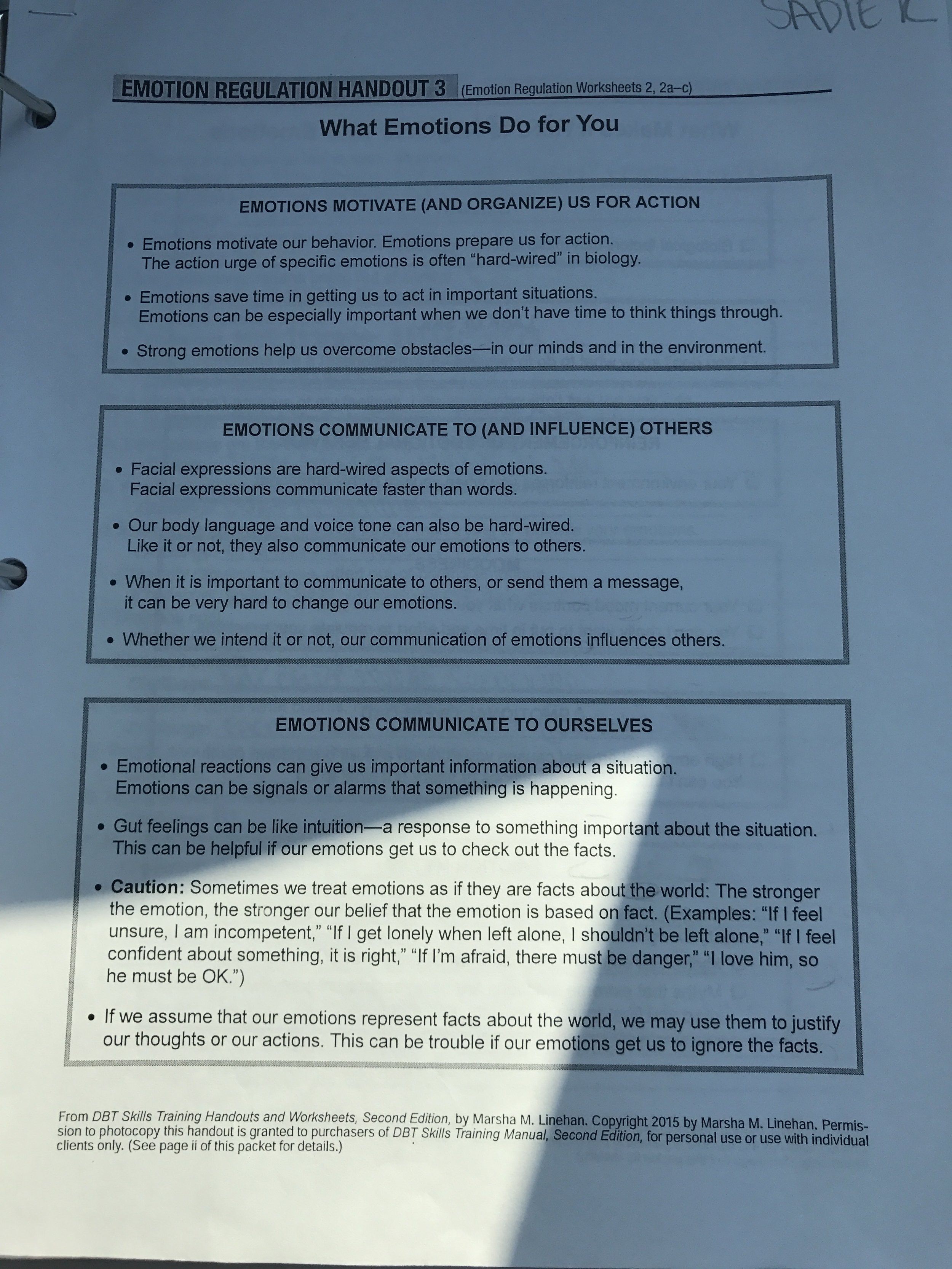
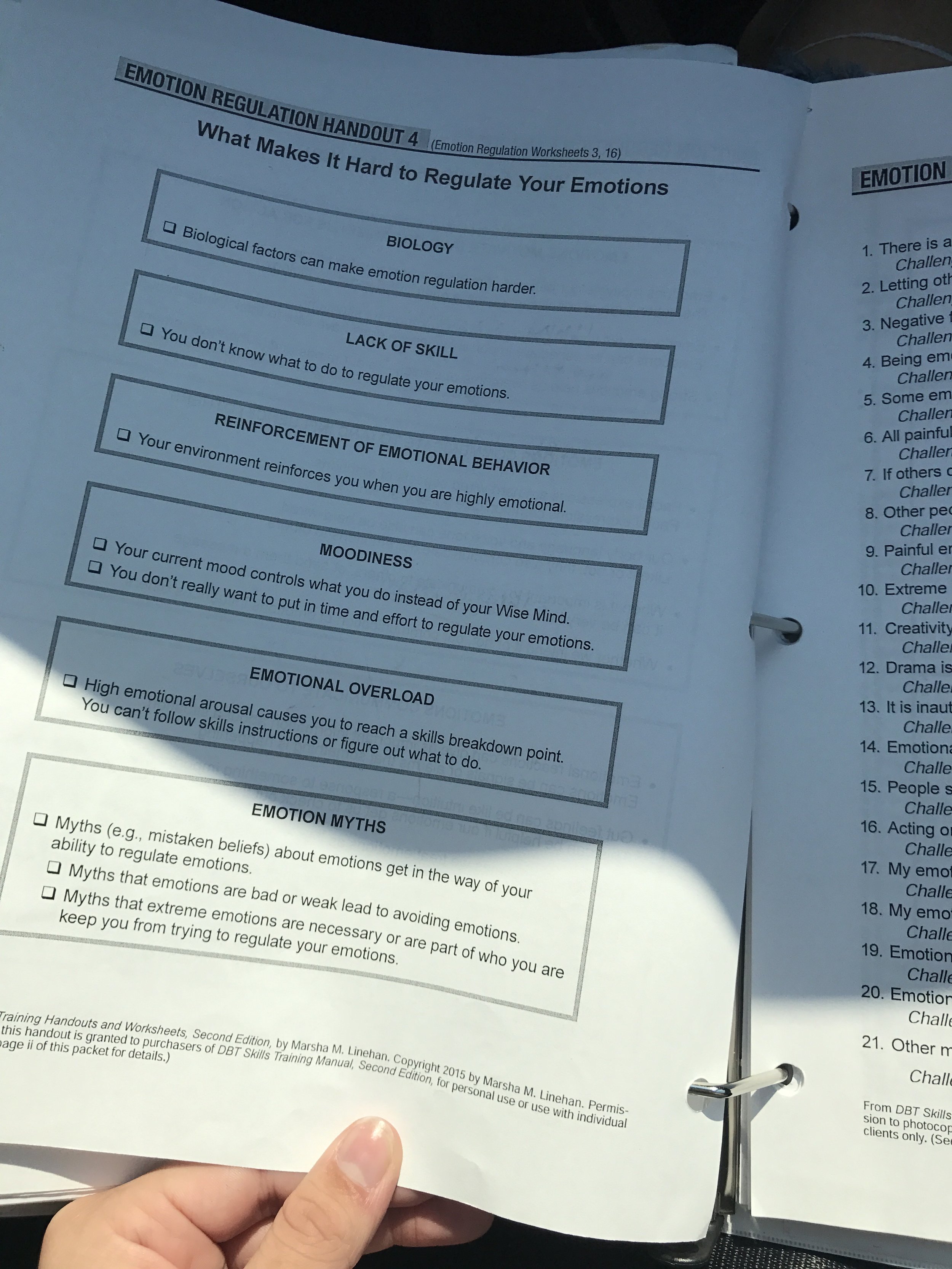
Episode Sponsors
🛋This week's episode is sponsored by Teen Counseling. Teen Counseling is an online therapy program with over 14,000 licensed therapists in their network offering support with depression, anxiety, relationships, trauma, and more via text, talk, and video counseling. Head to teencounseling.com/shepersisted to find a therapist today!
🍓This week's episode is brought to you by Sakara. Sakara is a nutrition company that focuses on overall wellness, starting with what you eat. Use code XOSADIE at checkout for 20% off your first order!
About She Persisted (formerly Nevertheless, She Persisted)
After a year and a half of intensive treatment for severe depression and anxiety, 18-year-old Sadie recounts her journey by interviewing family members, professionals, and fellow teens to offer self-improvement tips, DBT education, and personal experiences. She Persisted is the reminder that someone else has been there too and your inspiration to live your life worth living.
a note: this is an automated transcription so please ignore any accidental misspellings!
Sadie: Hello. Hello. And welcome back to she. Persisted. I am so excited. You're here today. I think you guys are really going to like this episode because these skills are the ones that I pull from most frequently when it comes to maintaining and improving my mental health in the long-term. So if you are new to the podcast, A little cliff notes version of my story.
I went to intensive treatment when I was 14. So I went to a residential program where I was there for 14 weeks. And then I went to a therapeutic boarding school for 14 months. And the residential program that I went to, it's called three east there's information about it on my website. But the program that I went to relied very heavily on DBT or dialectical behavioral therapy.
And I love DBT. It's one of my favorite things. It was what was a game changer for me and my mental health recovery. It's great because it's, evidence-based, it gives you really tangible skills to pull from and use when you're in crisis, improving relationships, regulating your emotion, staying mindful, et cetera.
And like I said, evidence-based, it really works for a variety of things, whether that's depression, anxiety, borderline personality disorder, and there's a whole lot more to be said about that. I'll link more in the show notes, but you can read tons of studies about it, but I try and integrate that into the podcast as much as possible, because it was just such a game changer for me.
And I want to share that with you guys. So today's episode is going to be all about regulating emotions. We're going to touch on creating a life worth living and what that is in DBT. We're going to talk about short term and longterm emotion, regulation, skills to use, and really how to be effective and navigating the ups and downs of emotions and be really skillful doing so.
So, if you haven't already, I did an episode a couple of months ago called the emotion to education you should have gotten. And that's really a precursor to this. It talks about the purpose of emotions, why we have them, what emotions, access, warning signs, how to cope with those. So I'm going to talk about.
Broad ways that you can regulate your emotions, but if you want really specific skills, ideas, and a better explanation about each of the emotions, I highly recommend you listen to that one. And you guys love that the downloads were really amazing on that. So I'm so glad it resonated. It is a denser episode, similar to this one where you're learning a lot.
But in my opinion, I think it's super valuable. So if you haven't listened to that, I recommend it. LinkedIn. Today's show notes, one more thing to add. I did a crisis survival skill episode a couple of weeks ago.
That episode goes in a lot of depth into what skills you use when you're in crisis. This is more just general. Day-to-day navigating less intense emotions. But just like you don't want to use crisis survival skills for regular emotions because they lose their effectiveness using day to day emotional coping skills.
Isn't going to work in crisis because the emotions are just so much bigger and intense and overwhelming. So day-to-day emotions is what we're talking about here. If you want to learn more about coping with really intense emotions, like anger or panic attacks, and like the anxiety that goes with that extreme depression, sadness, et cetera, I'll link that episode in the show notes as well.
But even if that's something that you struggle with, I do think there's something to be sad for learning the emotion regulation skills and getting those down pat, because. You are able to decrease your emotional vulnerability to those crisis moments, and you're really able to increase your baseline.
So if your baseline is like extremely depressed all the time, these emotion regulation skills can kind of move that up a bit. So when you do have a crisis and you do experience those low emotions, it's less of like, this is what I experienced all the time. It's exhausting. I don't know what to do.
And more like, okay, this too will pass and I will get back to my baseline that I've created. And that works for me.
The last, last, last thing I'll mention before we really dive in here is that all the DBT worksheets that I'm working from will be in the blog post for this episode, also linked in the show notes and all of this. Not created by me. This is from the dialectical behavioral therapy skills handbook and was developed by Marsha Linehan in her team.
So this is not something that I've just come up with in my free time. It is a comprehensive book of skills, which also will be linked in today's show notes. So that is where the credit goes there. And again, like I mentioned at the beginning it's evidence-based, which is amazing. So one of the very basic parts of DBT is the goal that you were working towards your life worth living.
So the patients that receive DBT treatment a lot of times are in crisis. They're overwhelmed. They are super depressed. Their relationships are struggling. A lot of the. Suicidality is at play, which was true for me when I did intensive DBT treatment. And so what this means is that before you can start learning any of these skills, you have to get the patient, the client, the individual to have some form of motivation to want.
Better a lot of the time there's hopelessness. You kind of don't understand what the purposes of learning these skills, if you don't even want to be alive, which is a really painful thing to navigate. And so at the very beginning of your journey, a lot of the time you will start thinking about what is your life worth living. so when your day to day experience is filled with extreme depression and anxiety and feeling isolated and alone and hopeless, And that life does not feel worth living. You ask yourself what would be worth loving, what relationships would I have in my life?
What would my mood be like when I wake up in the morning? What activities would I engage in? What do I look forward to? What are my values? How do I cope with the emotions that arise? And once you've been able to establish that you have a goal to work towards, yes, it is vague for me, it felt extremely unattainable.
I didn't even know if I believed I would get to that point. I did, but I didn't believe I would, but you at least are not just working towards this vague abstract goal of getting better. It's more. You are going to get to the point where you can regulate your emotions. You're going to get to the point where you're not suicidal every day.
You're going to get to the point where you can maintain a healthy relationship and feel validated and seen and heard. And then we work backwards and we use the DBT skills to build that life worth living. So if you are someone who is struggling with that hopelessness and not sure, kind of where you want to be with your emotion regulation and your, your life worth living in general, I definitely recommend doing.
Journaling activity. You can just write out a list. You can meditate on it, whatever works for you, but think about what that life worth living would look like and what you want to do to get to that point. And I think that's crucial before we dive into any of the rest of it. And it was really important for me before I understood what my life worth living was like.
There was no way for me to be emotionally invested in recovery. There is no way for me to be motivated to change because it didn't feel like it was possible. So. Life worth living is the first thing we establish.
And then the next thing to really walk through is your values and priorities as they relate to your emotion regulation. So this really does build into the life worth living. And there is a list that is provided in the skilled handbook of some pretty universal values and priorities in people's lives, worth living and people's life worth living.
I don't know the plural, you know what I'm saying? So the first is to attend to relationships. And so there's some sub tasks here, which is to repair old relationships, reach out for new relationships, work on current relationships and end destructive relationships. The next thing is to be part of a group.
So having close and satisfying relationship with others, feeling a sense of belonging, receiving affection and love being involved in intimate with others and have, and keep close. Have a family stay close and spend time with family members have people to do things with the next thing is be powerful and able to influence others. So have the authority to approve or disapprove of what people do or to control how resources are used. Be a leader, make money be respected by others. Be seen by others as successful become well known, obtain recognition and status compete successfully with others.
Be popular and accepted. The next thing is achieved things in life. So achieve significant goals. Be involved in undertakings. Believe things are significant. Be productive, work towards goals and work hard and be ambitious. The next thing is to live a life of pleasure and satisfaction. So having good time seeking fun things out that give you pleasure, having free time and enjoying the work that you do.
The next is to keep a life full of exciting events, relationships, and things. So try new and different things in life. Be daring, seek ventures, and have an exciting life. The next item is to behave respectfully. So be humble and modest, not draw attention to yourself, follow traditions and customs behave properly.
Treat others well, next is to be self-directed. So following your own path in life, being innovative, thinking of new ideas, being creative, making your own decisions to be free, being independent and taking care of yourself and those you're responsible for and having.
Thought and action, to be able to act in terms of your own priorities. The next thing is to be a spiritual person. So making room in life or spirituality at living life, according to spiritual principles, practicing a religion or faith growing and understanding of yourself, your personal calling and life's real purpose and discern and do the will of God or higher power and find lasting meaning in life.
The next thing is to be secure. So living in safe and secure surroundings, being physically healthy and FET, having a steady income that meets your needs and your family's basic needs. Next is recognizing the universal good of all things. So being fair, treating people equally and providing equal opportunity is understanding different people and being open-minded and caring for nature in the environment.
Next is contributing to the larger community. So helping people in those in need, caring for others while being improving society, being loyal to friends and devoted to close people.
Being committed to a group that shares your beliefs, values and ethical principles being committed to a cause or to a group that has a larger purpose beyond your own making sacrifices to others. And the next item or bucket is working on self-development. So it developing a personal philosophy of.
Learning and doing challenging things that help you grow and mature as a human being. And the last category is having integrity. So being honest, acknowledging, and standing up for your personal beliefs, being responsible person and keeping your word to others, being courageous and facing, and living life, being a person who pays debts to others and repairs damage that you've caused.
And lastly, Being accepting of yourself, others and life as it is without resentment. So these values and priorities will be different for every person. But the reason that they're outlined is because when these areas of life are out of practice or out of alignment, they are really closely linked to mental health issues. So we talked about having a income that can support you and your family's basic needs. The research shows that when you are below that line, when you are below that line of poverty, The risk of mental health issues is a lot higher.
Similarly, when people are not feeling professionally fulfilled or feeling like they have a purpose at life suicide and depression rates are higher. A book that I think explains these environmental kind of causes. If you will really well is lost connections by Johann Hari. I'll link that in today's show notes, but it goes into depth year and it talks about how this data was gathered.
The studies that were done and their real life implications, which is super exciting. So, like I mentioned, these will be different for every person. Maybe it's not as important for you to contribute to a community, but you're really big on self development or spirituality, isn't your top priority.
But having a life of exciting events is so figure out where your values lie. Look at those little checklist items and work to be in alignment with them because when we're out of alignment, that's when things can start to feel emotionally off and more stressful.
And our emotional vulnerability is a lot higher.
This week. Sponsor is teen counseling. Teen counseling is an online therapy program with over 14,000 licensed therapists, their network, if you've ever heard of better help, teen counseling is their teen brand. So if you are looking to try therapy for the first time or switched things up with your therapist, this is a great way to start. They offer support on things like depression, anxiety.
Relationships trauma and so much more they offer services via talk, text and video counseling. So you can really cater it to me, your needs, whether you just want someone to give advice and, and support and coping recommendations and a tough moment, or you want to have an audio call or you feel comfortable doing a video call and normal session, whatever you need, they can support.
So, what you're going to do is you're going to go to teen counseling.com/she persisted. You are going to take a quick survey about what you're hoping to work on in therapy. And this is that they can match you with a therapist that best meets your needs. From there you go ahead and put an, a parent or Guardian's email, and this is so that they can give consent to treatment.
They, none of them. Just close. Your privacy is protected as it should be in any therapy relationship. And so your parent gets a super discreet email. I send it to myself, don't worry. And it says Sadie or whatever your name is, is hoping to work with a therapist at teen counseling, click here to learn more, give consent for treatment and provide.
So, what you're going to do is you're going to go to teen counseling.com/uberassist head and find a therapist that meets your needs today. Again, that is teen counseling.com. Flashy persisted
So with that, the first skill that we're going to learn is the police skill. So pleases an acronym that stands. Treat physical illness and they like capitalize the P and the L and physical, which a little rough, but we go with it eating, balanced, avoiding mood, altering substances, balanced sleep, and get exercise.
So the please acronym and the police scale is for taking care of your mind by taking care of your body. So for treating physical illnesses, you're seeing a doctor when necessary, if you are taking a medication, you are taking that regularly. We know that mental and physical health are closely linked to when you are physically like super sick or not feeling well, your mental health takes a toll as well.
So we want to minimize. Is that risk of decreasing your emotional vulnerability, same thing for eating. So there's a spectrum here. Maybe it's you just get hangry. If you don't have enough snacks or maybe you're struggling to get enough nutrients you're restricting bingeing, whatever that is.
And that's taking a big toll on your mental health. So these are all factors that can have a negative impact when they're not kept in check. So for eating, don't eat too much or too little eating regularly and mindfully throughout the day. And staying away from foods that feel make you feel overly emotional.
One little tidbit to add in here that we learned about in my abnormal psychology class this week, if you struggle with Benji, dang. So a lot of the times when you struggle with binge eating or restricting, it is really scary to eat regularly throughout the day.
You think that it will cause you to gain weight, which a lot of the times is an individual's biggest fear. And the studies show that the, the weight that's gained is really negligible.
I think it's like one to two pounds. And that's because you are eliminating these binges, which have a huge amount of caloric intake. And so when you're able to regularly eat, you're not only having the negligible weight gain. But you are no longer fighting against your body. So we were talking about binge eating and why binges are so difficult for people to avoid when they are depriving themselves of food.
And it's because it's that evolutionary need that has been there from the beginning of humans. If we are hungry and food deprived, he will eat as much as possible so that we don't die. Because at a time when you didn't know where your next meal was coming from, like caveman days, if there was a lot of food available and you were starving, you would eat a lot because you didn't know when your next meal would be available.
So now that we're living in modern day and age, that's not necessarily relevant, but that same principle comes out with binge eating and restricting. And for me, another tip that I'll add here is if you struggle with eating regularly, what I did when I was at McClain, which was the residential program, is I came up with a list like two to three breakfast items that worked really well for me, two to three lunch items, two to three dinner items and snacks.
And I would just pull from that list. And so I knew that if I was eating one of those meals, I was going to be full. I was going to be well fed. I would have my nutrition needs met and I was able to eat regularly. Like I said, when you're not starving and you're not ignoring your hunger cues, it's a lot easier to not binge and to maintain regular eating.
The next category is avoiding mood altering substances. So the description here is staying off of illicit drugs and alcohol and monitor. If at all, there's a couple of things I like to add here. If you want to learn about the connection between substances and mental health. I did a really great episode with a doctor named .
Jay Faber. And he's from the amen clinic. And we talked all about the connection between teen substance use and mental health challenges. So if you want to learn more, I'll leave that link below, but like you can imagine it's not great using substances. It doesn't do anything good for your mental health.
So if you want to learn more in depth there. I will leave that option. I know that, especially for college students, it's something that's very common and very culturally normal, but it's something to be really mindful of and aware of, if you are worried about your mental health, then the other thing that I'll add here is caffeine.
We don't always think of caffeine as a mood altering substance, but it can be, especially if you struggle with anxiety. Drinking a lot of coffee or having a lot of caffeine can make you a lot more emotionally vulnerable to feeling anxiety and to messing up your sleep. So I like to add that in that bucket because it's helpful to be mindful and aware of when taking care of your physical health.
The S and please is for sleep balanced. So trying to get seven to nine hours of sleep a night, or at least the amount of sleep that helps you feel good. So it's going to be different for everyone, but again, for most people at seven to nine hours, and the next part of this is keeping a consistent sleep schedule, especially if you have difficulty sleeping.
So if you struggle with insomnia, if you struggle with waking up throughout the night, you are going to need. Having a very strict sleep schedule or at least doing consistently what works for you because you will probably be a lot more emotionally vulnerable to being sleep deprived.
And we know that when we're not getting enough REM sleep, we're not able to emotionally recharge. We're a lot more emotionally vulnerable at me, especially when I don't sleep well. I'm so grumpy. I'm so irritable and I notice it immediately. For anyone who is really into tracking their sleep and notices that it has a really big impact on their mood.
A recent recommendation has been the aura ring. I am obsessed, even though it every morning, it's like, you did not sleep very well. And I'm like, I know, but thank you for giving me the data. But it's great. It tracks your steps so you can unplug more when you're exercising. It tracks other kinds of exercises.
Well it gives you a sleep score every single day. You get a readiness score and it's just great I've learned that my baseline of being like, Hey, I think I slept pretty well. Isn't really that great. Like I'm not getting enough sleep. I'm not getting enough deep sleep.
And so I've been able to make changes in my night routine and my morning routine and throughout the day to try and improve that and get the numbers where I want them to be. So if you were asleep nerd, I recommend that it'll be linked in today's show notes. And then this is going right into the next category of getting exercise.
If you are struggling with falling up. Incorporating movement throughout your day is huge. And can help you feel more tired at night. I also did a whole episode on sleep hygiene that will be linked in today's show notes. So anything and everything you would ever need to know about having a good sleep routine, struggling with insomnia.
What works for me, my sleep routine, the data there listened to that episode. So getting access to. So the description here is do some sort of exercise. Every day, try to build up to 20 minutes of daily exercise. I actually went to a nutrition appointment this week and they said that the goal is 150 minutes of exercise per week.
I know that could be very overwhelming. What I've been doing recently is trying to do like 30 minutes a day, like on the elliptical or the StairMaster or the treadmill. And I really frame it as like trying to help me sleep better. And I, I enjoy it. I'll watch a show, listen to music. And I'm not really worried about like how fast I'm going.
I'm just doing my 30 minutes. It's a nice break from studying. So that is something that I recommend. Another note here is that if you notice that exercise has a really positive effect on your mood and you are a morning person, I'm not. So a lot of the times I do it later in the day, but the greatest impact on your mood will be when you exercise in the morning, because.
The data shows that people experience the positive effects of exercise for like seven to eight hours after they have that period of movement. So if you can try and get that in the morning and it'll help you be more awake throughout the day, more alert and have more positive emotion. So that as the police gal, we are reducing our physical vulnerabilities to help our emotional vulnerability.
And when any of these things are out of whack, your mental health will be as well. So it's a really great way to, again, just decrease that vulnerability and overall take care of yourself. So the next skill is the ABC scale. A chance for accumulate positive emotions, build mastery and cope ahead of time with emotional situations.
So the overview of the skill as we are reducing the vulnerability to emotion mind, which is your part of your brain. That is really just emotion focused is emotion driven. It's very hot and you're not really paying attention to logic at all. So we're reducing that vulnerability to build our life worth living.
So I'm going to give you a quick overview of the ABC scale, and then we'll go into a little bit more depth in each of the different parts of the scale. So for accumulating positives is one of my favorite skills. I talk about it a lot. In the short term, you are doing pleasant, things that are possible.
Now in this moment, I don't give you some examples in a couple of minutes, and then long-term, it's making changes in. Positive events will happen more often in the future. So you are truly building your life worth living. If you're building mastery skill is doing things that help you feel competent and effective to combat helplessness and hopelessness.
And coping ahead, we are rehearsing and planning ahead of time so that you are prepared to cope skillfully with emotional situations. So accumulating. In the short term, you're increasing pleasant events that lead to positive emotions. A great goal is to try and do one thing each day. That is a pleasant event for you and to just really quickly give you some ideas, this is a list of. 225 different pleasant events, which will be on the blog post. But that could be playing a sport, flying kites, sleeping painting, traveling, or going on vacations. There are endless things here and it's just what you enjoy for me. It's having my favorite cup of coffee in the morning. I like going on walks. I love petting and seeing dogs, especially my dogs, reading a good book, watching a show that I really enjoy calling friends and family members.
All of those kinds of things. In addition to building positive experiences in the moment, you are also practicing opposite actions, you are avoiding avoiding emotions. We will go into a lot of depth in this in a little bit. But that's one of the part of the accumulating positives and we are being mindful of pleasant events.
We're focusing our attention on positive moments when they're happening. We are refocusing our attention to when our mind wanders to negative aspects or other things, and we are participating and engaging fully and each experience.
We are being unmindful of glorious, which I bet you didn't think we were going to recommend that you're not mindful, but we are not going to focus on when the positive experience will end. We're not going to think about whether you deserve the positive experience, which is something I struggled with for such a long time.
Not thinking I deserve positive relationships or things I enjoyed because I was just so depressed and I didn't think I just even deserve to be depressed. And lastly, what might be expected of you in this moment that you aren't necessarily doing? So we are avoiding thinking about those things.
We are not being mindful there, but we are being mindful of the positive experiences.
So in the long-term, we're not just having these positive emotions, but we are really accumulating them and they build and compile and compound into a life worth living. So we're making changes in our life so that positive events will occur in the future.
So there are six. So there are seven steps here and I'll read those to you. And there's like some examples, which we'll also give. So the first step is to avoid avoiding. So you're going to start now to do what is needed to build the life you want. Step one is avoid avoiding. So we're going to start now to do what is needed to build the life you want. Step two is identify the values that are important to you. We just talked about those. So what values are really important to be in your life? So examples which we talked about as being productive, being part of a group, treating others well, be physically fit, whatever that is for you, knowing them so that you can stay in line.
Step three is to identify one value to work on right now. So ask yourself what is really important to me right now to work on in my life. Step four is identify a few goals related to this value. So ask yourself what specific goals can I work on that will make this value part of my life. So if your value that you're going to work on is being productive. Some examples is getting a job where you can do something useful, being more active, keeping up with important tasks at home and finding a volunteer job that will use the skills you already have. Step five is choosing one goal to work on now.
So two, a pros and cons and decide what goal you're going to work on in this moment. So an example is to get that job where you're doing something useful. Step six is identifying small actions to take towards your goal. So ask yourself, what are some small actions that I can take an examples are visiting places to look for job openings or looking online, submitting applications, writing resumes, and checking out benefits of.
Job listings. And lastly, you are taking one action step now. So an example is to go on the internet and check jobs in your area. So we talked about all of those different values and priorities that might be applicable to you in the long-term. Like I mentioned, when you were out of alignment with those, it feels really yucky.
So these are the immediate steps that you can take to build a life that is really in line with those values that are so important to you.
so that is the accumulating positive skills for both short-term and long-term and was one of the easier skills you just do what you enjoy. But the key is to plan those items. It's not something that spontaneously happens, but you are being intentional about doing things that bring you joy. You're accumulating them over time.
You're decreasing your emotional vulnerability and make a list of things that you enjoy doing and sprinkle them throughout your day, and really stay present in them. Enjoy them and accumulate them throughout the long-term.
This week's episode is brought to you by Sakara. Sakara is a nutrition company that focuses on overall wellness, starting with what you eat. You might've heard of their meal delivery services. They are gluten-free vegan, non-GMO organic, all of the things, and they get delivered to your door. No prep required.
So they have breakfast, lunch, dinner, and snacks. It's super convenient. And it's an amazing way to make sure that you are getting all of your nutrients and your food is fueling you for all of your activities that you are doing. They also sell a ton of wellness essentials. Two of my favorites are their detox drops.
They are chlorophyll drops. I know you've seen them on Tik TOK. I have as well. You add them to your water. And what I like about these ones is that they don't add a taste. So even though the water is green, because the chlorophyll you're getting all the benefits, it doesn't taste like gross or like a greens powder.
It literally just tastes like normal water, which is one of my favorite parts of it. My other favorite is their sleep tea. This is an amazing thing to add to your night routine. It has came a meal and lavender to relax and wind down before going to bed.
It's a great addition to your nighttime routine. I highly recommend it. So if you want to check out Sakara and their wellness essentials, you can use code at checkout for 20% off your first order. Again, that is code X O Sadie at checkout for 20% off your first order using the link in today's show.
Now.
So the next part of the ABC skills building mastery. So there are four steps here. The first is to plan on doing one thing each day to build a sense of accomplishment to his plan for success, not failure. Three has gradually increased the difficulty over time. And four is looking for a challenge. When we get better at things, when we are good at things, it boosts our self esteem.
It boosts our mood. It makes us feel effective. The podcast has been a really big thing for me with building mastery, same thing with social media. I enjoy it. I love getting better at it. And it's, it's a challenge. And so having something in your life that you are looking to improve, especially something that you enjoy can really help increase your emotional vulnerability and increase your baseline over a long period of.
Coping ahead as another really helpful scale. So there are four steps here. The first is you are going to describe the situation that is likely to prompt the problem behaviors. You're going to check the facts, be specific, name, the emotions and actions likely to interfere with using your skills.
Second, you're going to decide what coping or problem solving skills you want to use in the situation and be super specific here. You're going to write out how you're going to cope with the situation. With your emotions and also any urges you might have third year going to imagine the situation in your mind as vividly as possible.
So imagine yourself in this situation, not watching it, but you are navigating yourself and four, you're going to rehearse in your mind, coping effectively. So think about your actions, thoughts, what you say, how you say it, how you cope with new problems that might come up. And then the key here is to rehearse, coping effectively with your most feared catastrophe.
So say you are starting at a new school and you're like, the worst thing possible would be to fall on my face, down the stairs and everyone laughs or something like that. Okay. Walk yourself through that. What are you going to do? You're going to fall down the stairs and then you're going to get up or are you going to laugh it up?
Are laugh it off. Are you going to do deep breathing? Are you going to ask someone to like help you if you've broken your legs? Like, what exactly are you gonna do? And you no longer in that Headspace of, oh my gosh, I'm not sure what's going to happen because you've just thought about what's going to happen.
You're going to cope. You're going to walk yourself through the situation and you know how you're going to deal with it. If that problem arises. And the fifth step is to practice relaxation after rehearsing. So it will probably bring up anxiety to rehearse those worst case scenarios. So cope with those emotions that arise in that's in itself, like a little InVivo exposure to the symptoms of anxiety.
Coping ahead is not just used for anxiety. I think it's really great when you're going into a difficult conversation that might result in a conflict. If you're really angry about something coping had with how you're going to stay, calm is good. If you think you're going to be overwhelmed. I think with stress, coping ahead is a great idea.
I love it for anxiety. I think it's so effective. But any situation where you think that an intense emotion might arise, coping ahead allows you to decrease the intensity of the emotion. And so you are able to regulate your emotions more effectively as short and long-term. So that is the ABC police.
Some of my favorites. Those are probably the core of the emotion regulation module. Those are the most commonly known.
So we're going to talk about two more things to really round this out. We're going to talk about mindfulness of current emotions and changing emotional responses. So it is important to be able to decrease our emotional vulnerability, but it's also important to be able to regulate our emotions when they arise.
And so that's what you're going to do with these two skills.
So with mindfulness of current emotions, we are letting go of emotional suffering. So the first step is to observe your emotion, your, a stepping back and noticing the emotion. This is my favorite thing. As you are experiencing your emotion as a way of, so it's coming, it's going, it's increasing and decreasing and intensity.
You can try to imagine surfing the emotional way of the goal is to not block or suppress the emotion or get rid of push it away. When we suppress emotions, they come back stronger and more overwhelming. So we're not blocking you're suppressing, but at the same time, a little dialectic here, we're not trying to keep the emotion around.
We're not holding on or amplifying the intensity. We're also going to practice mindfulness of the body sensations. I noticed that sometimes I can be kind of out of touch with what exactly I'm feeling, but if you listen to your body and like, okay. Or like my hand shaking is my heart beating faster. Am I like frowning?
You can kind of be more aware of what you are experiencing and then figure out how to cope with that emotion. So notice where in your body you're feeling emotional sensations, experiences, sensations, as fully as you can, and observe how long it takes before the emotion goes down. Remember, you are not your emotion, so you don't have to act on the emotion.
And there are times. It felt different. I think this is a really big thing for depression and anxiety. People are like, I'm depressed, I'm anxious. I have anxiety. I have depression and it becomes a really a part of your identity. And instead we can think about it as a wave that comes and goes, we feel depressed.
We feel anxious, but we are not depressed or anxious forever. And the last part of this is to practice loving your emotions. So respected. It serves a purpose. It's kept us alive as we've evolved so we're not judging the emotion, but we're practicing willingness and we're radically accepting the emotion as it comes. So that is the mindfulness of current emotions. And then if we are mindful of our emotion and we decide, you know what, I don't really know if the intensity of duration of this emotion is effective, we can change our emotional response. So there are three skills here. Check the facts, opposite action and problem solving. So with the check, the fact scale, this is a huge one.
It is something that gets used all the time. I think it was a really big one on family therapy. Like whenever we'd start to get into an argument, are they so annoyed? They checked. Is that accurate? It's super helpful. And interpersonal situations, it's really helpful with anxiety when you're like, this is definitely going to happen.
And it's like, is it though, is there really going to be a shark attack? If you go swimming in the ocean, what's the statistical probability. Let's unpack that. So check out whether the emotional reaction fits the facts of the situation and you can change your beliefs and assumptions to fit the facts, and that can also help change your emotional reaction to the situation.
So it let's go back to the first aid and new school example. If you are worried, you're going to fall down the stairs and it's going to be so embarrassing and everyone's going to be watching and laugh at you. Is that really likely to happen? Check the facts there. And then, because that's not likely to happen.
We can change our beliefs and assumptions instead of being like, I'm definitely going to embarrass myself and fall down the stairs. We can be like, we can go do a happy, medium and bag. It is possible that I'll slip and fall, but that's highly unlikely.
The next skill is opposite action. This is a huge one in one of my all-time favorite skills. So when your emotions do not fit the facts, when the intensity and duration. Art making sense or when acting on your emotions is not effective. So if you're a super angry and like, I don't know, yelling at a teacher is not effective.
We act the opposite 100% to change your emotional reactions. A huge example here is when you're feeling depressed. If you, if your emotion is telling you to stay in bed and isolate, you are going to get out of bed, you're going to walk around. You are going to engage with other people which will help improve your feelings of depressed.
There are so many examples here of anxiety is telling you to isolate and withdraw from the threat. Do a little bit of exposure therapy, go towards it, expose yourself in a healthy way. Just so many examples and it's one of the skills that I pull from most frequently. And the last part of this is when the facts themselves are the problem.
So when you've checked the facts and you're like, okay, my emotions do fit the facts. But the, it just it's a situation that Sox, I don't have a lot that I can can control about it. You can try and solve the problem to reduce the frequency of negative emotion. So say that you are in a class.
And the professor keeps giving tests that are just like, not even related to what you were learning in the class. And it feels really unfair and you're not doing well. And your, your emotion is justified because you all your other friends in the class also aren't doing well on the test. Average is like really bad, whatever the situation is.
We can problem solve. So maybe that means going to office hours and talking to the teacher. Maybe that means studying more. Maybe that means dropping the class and taking it with a different professor, whatever the situation is, we are solving the facts and the situation we are dealt that we can decrease the negative emotions when feeling those in long-term it's not effective.
So a little bit more on check the facts. So many emotions and actions themselves are brought on by our thoughts and interpretations of the events, but not actually the events themselves or event influences the thoughts, which influences our emotions and our emotions can also. Thought and our emotions can also impact our thoughts a lot.
There's this debate in psychology about the different ways that emotional responses arise. Some of it is like you feel the emotion and then you physically realize that you having this emotion, and then you have thoughts about it. Sometimes you have the thoughts and then you feel the physical parts of the emotions.
This is kind of what that's talking about. So we are examining our thoughts and checking the facts to help us change the most. So there are six questions you can ask yourself. The first is what is the emotion I want to change? What is the event prompting? My emotion. What are my interpretations, thoughts and assumptions about the event?
Am I assuming a threat? What's the catastrophe. And does my emotion and, or its intensity fit the. So, I know I just threw a lot of information at you guys, but really being on top of your skills can really help you be more emotionally regulated and on top of things and feeling good. And I really hope that this was helpful and educational.
If you enjoyed this week's episode as always make sure to leave a review on apple podcasts and Spotify, we are getting towards 100 views on apple, which is insane. And I'm going to do a giveaway, which I'm super excited about. Make sure to follow along in Instagram and she persisted podcast. If you have any questions about this week's episode, don't hesitate to DME asked me, email me and.
If you liked it, make sure to share with a friend or family member share on social media. If you share an Instagram I'll repost and give you a little shout out at ACCI persisted podcast, .
© 2020 She Persisted LLC. This podcast is copyrighted subject matter owned by She Persisted LLC and She Persisted LLC reserves all rights in and to the podcast. Any use without She Persisted LLC’s express prior written consent is prohibited.














![209. How to Set Habits You'll ACTUALLY Use [Solo]](https://images.squarespace-cdn.com/content/v1/60425bb2aadd3e6f7955d493/1737075020093-ZK08LD8R9CYK08CVV37N/Sadie-53.jpg)

















